Text
FEAR & TERROR
There’s nothing like impending death to rouse you from existential boredom
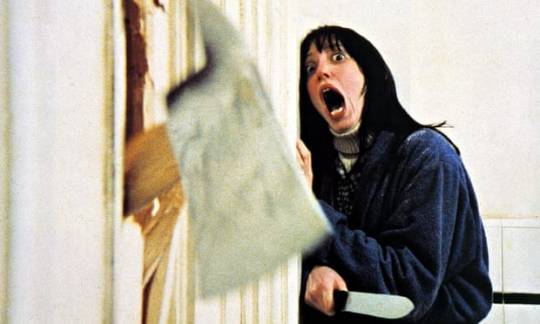
Shelley Duvall - The Shining (1980)
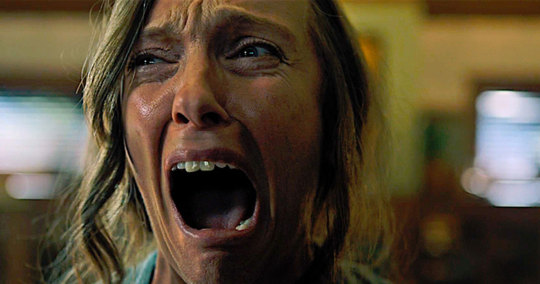
Toni Collette - Hereditary (2018)
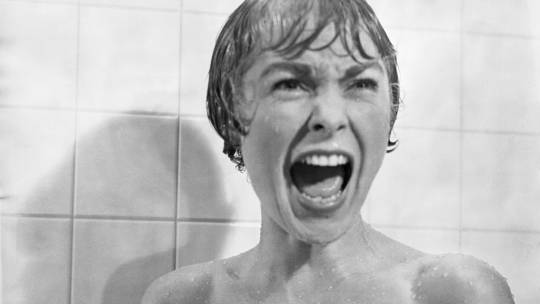
Janet Leigh - Psycho (1960)
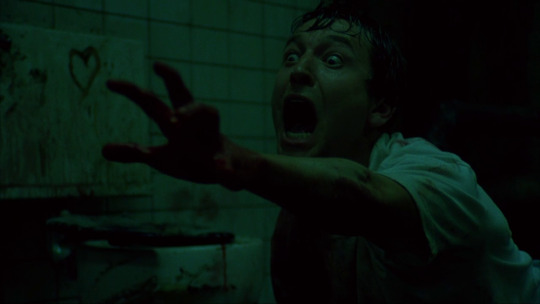
Leigh Whannell - Saw (2004)
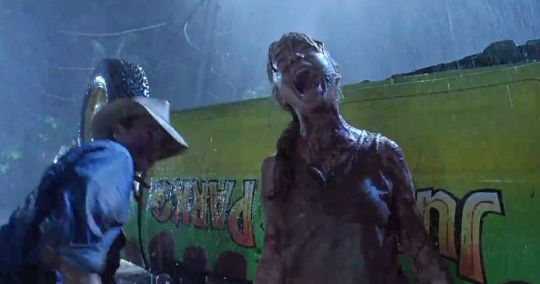
Ariana Richards - Jurassic Park (1993)
#jurassic park#hereditary#saw#psycho#the shining#fear#terror#cinema#movie#films#horror films#alfred hitchcock#stanley kubrick#toni collette#janet leigh#leigh whannell#shelley duvall#scream#ariana richards#dinosaur#scary#classic#gore
13 notes
·
View notes
Text
I feel pretty and the discrediting voice
Avery LeClaire is everyone’s dream. She is a model of beauty, carreer success and prestige whom the main character, Renee Barrett (Amy Schumer), an IT employee in her company, is dying to pursue. Direct heir to the family business of luxury cosmetics, Avery (Michelle Williams) is supposed to impress her grandmother with new ideas and be the new face of Lily LeClaire Cosmetics. And yet, who would think that this young and beautiful woman is actually deeply insecure and lacks self-confidence?

From Renee’s point of view, Avery is an angel, hence her first apparition on screen filmed in slow motion to convey a dreamlike atmosphere. One can see Avery crossing the company hall in a very elegant and graceful manner, and rushing like if she was flying in the air.
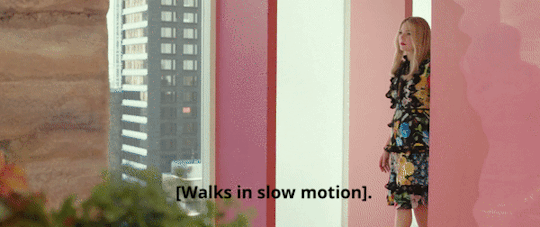
Renee thinks very poorly of herself and idealizes Avery. Held back by self-esteem issues, Renee thinks she is not pretty, skinny and glamorous enough to apply for a secretary position within the company and to enter into a relationship with a man. But all changes when she hits her head during a fitness class and wakes up convinced she became her best self. Galvanized and over-excited by her new look, Renee starts achieving the personal and professional goals she has been secretly yearning for all this time : she is now dating a very nice guy while being wooed by Avery’s sexy brother; she gets the secretary job and is even asked to give her opinions about Lilly LeClaire Cosmetics’ new communication strategy.




While Renee is getting empowered by her new positive perception of herself, Avery reveals her major flaw : her voice. Cheesy, squeaky, high-pitched and weak, Avery’s voice does not fit with her character and what she is supposed to embody, hence her lack of assertiveness.
youtube
I feel pretty is a film about self-acceptance and self-esteem which are the cornerstones of genuine happiness and well-being. In the end, it is not about being pretty but feeling pretty that matters. If one only complies with the way others look at oneself and yields to modern standards of aesthetic beauty, it can only lead to growing social uneasiness and dissatisfaction. Avery is beautiful and unique thanks to her voice and not despite of it. Renee is beautiful thanks to her curves and spontaneous personality.
When Renee finally understands that there was no « magic » involved in her success and that she was the same person all along, she delivers a strong plea for self-confidence at a fashion show which stands as the morale of the story :
« When we’re little girls, we have all the confidence in the world! We let our bellies hang out and we just dance and play and pick our wedgies. And then, these things happen that just they make us question ourselves! Somebody says something mean to you on the playground! And then we grow up. And you doubt yourself over and over again, until you lose all that confidence, all that self-esteem! All the faith you started with is gone! But what if we didn’t let those moments get to us? What if we were stronger than that? What if we didn’t care about how we looked? Or how we sounded? What if someone tells us we aren’t good, or thin, or pretty enough, we have the strength and the wisdom to say, ‘what I am is better than all that! Because what I am is me! And I am proud to be me!’ »
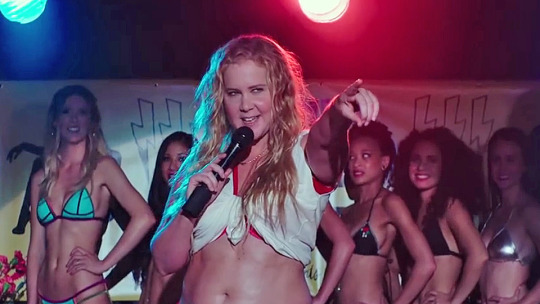
#i feel pretty#michelle williams#amy schumer#renee#avery leclaire#comedy#voice#squeaky baby voice#self confidence#acceptance#beautiful#self esteem#pretty#nobodyshaming#be proud#love yourself#busy philipps#emily rajatkowski#rory scovel#ethan#tom hopper#naomi campbell#grant leclaire#aidy bryant#body curves
19 notes
·
View notes
Text
WRATH
Soon I will pour out my fury on you and unleash my anger against you
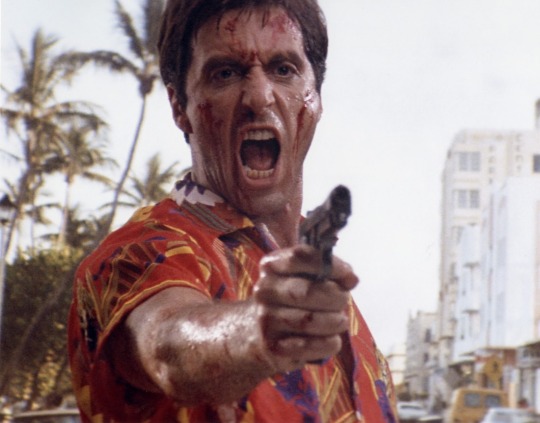
Al Pacino - Scarface (1983)

Emma Corrin - The Crown, season 4 (2020)
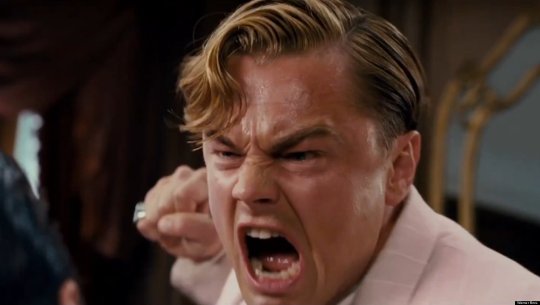
Leonardo DiCaprio - Django Unchained (2012)
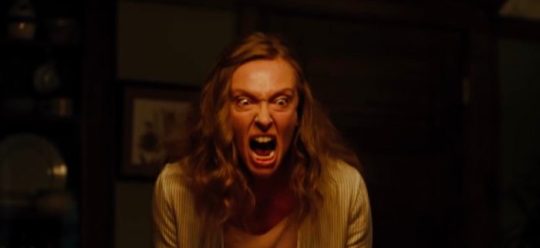
Toni Collette - Hereditary (2018)

Gary Oldman - The Professional (1994)
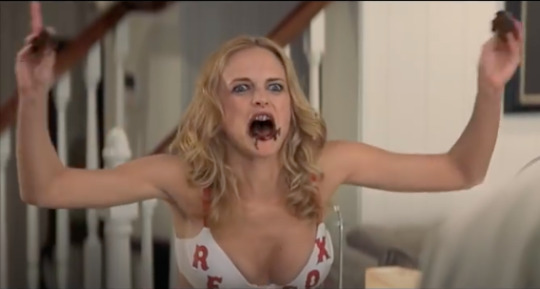
Heather Graham - Anger management (2003)
#anger#wrath#scream#cinema#performance#anger management#the professional#django unchained#hereditary#the crown#scarface#leonardo dicaprio#heather graham#toni collette#gary oldman#emma corrin#al pacino#bible quote
18 notes
·
View notes
Text
Joker and the symptomatic laugh
Never before, in the history of cinema, has a laugh been such a source of uneasiness and discomfort
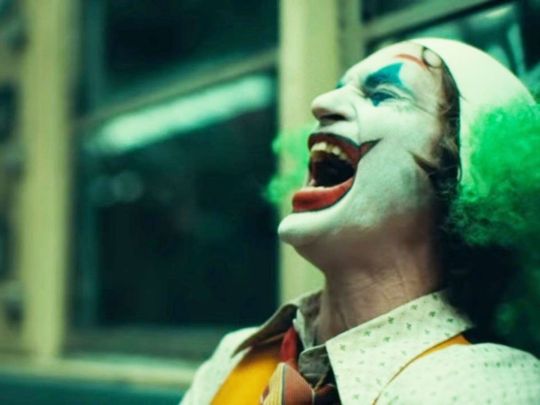
Contrary to previous portrayals of the emblematic villain of the DC comics, Batman, as a malicious, crazy and evil character, Todd Philipps chose, in this version, to make him a human first; a tormented human being struggling with life in Gotham City.
By digging through the psyche of the soon-to-be villain, to get to the roots of the Joker’s mythology, the director manages to subvert the conventions of the superhero film sub-genre. Though subverted, the well-known manichean approach assumed in such films reveals itself here in the manner in which the main character strives to combine his ingenuous nature and the chaotic outside world. Todd Philipps relies on the evocative power of the voice to build his psychological thriller. Indeed, the character’s mental distress is expressed by a nervous laugh that works as a kind of leitmotiv throughout the film.

In Joker, Joaquim Phoenix plays the role of Arthur Fleck, a pitiful professional clown and aspiring stand-up comedian who lives with her mother in a dingy apartment. Simple-minded and excessively naive, Arthur keeps being bullied and ridiculed wherever he goes. Wantonly beaten by strangers, mocked by his colleagues, laughed at on TV, abandoned by social welfare services, and coming from a dysfunctional family, Arthur progressively goes mad and violent, just like Gotham city; a city plagued by political corruption, vice, poverty, filth, unemployment, extreme violence and delinquency.
The inevitable psychological distress, that emerges from so strong a contrast and so many repeated physical assaults, does find not only its physical expression into a nervous laugh but also its symbolic expression into the joker’s vocation as a clown. As such, it comes as no surprise that the film opens with these two central and closely intertwined themes.
The opening scene shows Arthur putting clown makeup on his face while listening to the news on the radio. Instead of showing a colorful and enchanting depiction of the circus scene and its stages, Todd Philipps immerses his public into a dimly lit and rather gloomy room that looks like an old and insalubrious lock room. The environment is plagued by outer and inner noises due to traffic congestion and the radio which keeps airing unfortunate news about the state of the city. Filth, garbage, typhoid fever, bad smell, rats, increase in heating oil prices… those are the news which help to create the stuffy atmosphere in which Arthur grows in professionally. From the start, one has the feeling to suffocate and witness something pathetic at work; a feeling amplified by Arthur making faces in front of the mirror of his dressing table.
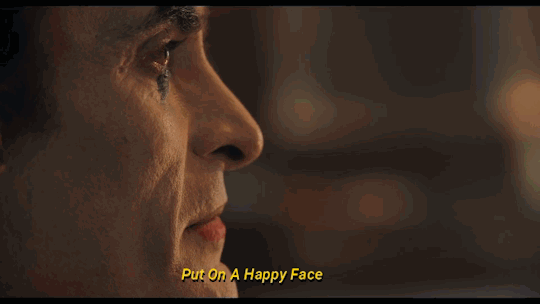
Arthur seems unable to smile naturally and spontaneously to such an extent that he needs to stretch his mouth with his fingers to mimic a smile; a smile made pathetic by the tears running down his face. Arthur’s factitious smile and look of despair present, at first sight, a contradiction with the character he is supposed to embody but if one takes a closer look at the symbolic of the clown in pop culture, this attitude reveals the drama that exists behind such a figure. Behind the extravagant make up and exaggerated facial mimics generally lies a darkness which can go from deep sadness to monstrosity.
In the last decades, the clown has become an ambiguous, ambivalent and subversive figure due to the visual dichotomy between the surface (the make up, the facial mimics, the caricatures and the bright colors) and what is under the surface (the identity, the life story, the feelings). What is under the surface is, by definition, hidden from view, therefore open to imagination, and synonymous with concealment, hence the disturbing strangeness that emerges from the potential dangerousness of such a concealment. In addition to this, the mirror is also used to underline Arthur’s dual nature. By duplicating one’s image, the mirror signifies conflicting personalities and can mark a need for introspection.
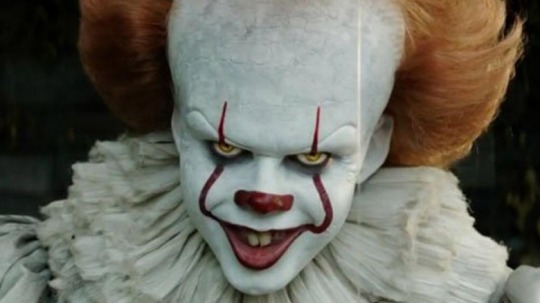
Pennywise, the evil clown in It by André Muschietti (Stephen King)

Twisty, the clown inspired by John Wayne Gacy, known as the Killer Clown, in American Horror Story by Ryan Murphy
In Joker, Arthur successively fits the different representations involved by the idea of duality, from the caring, harmless and cheerful clown to the sad, neurotic and eventually violent clown. In that respect, it is worth mentioning the direct reference between Joker and The King of Comedy by Martin Scorsese (1983), in which Robert De Niro, playing a delusional and aspiring stand-up comedian, is so desperate for recognition that he goes as far as to abduct the famous talk-show host, Jerry Langford, to appear on his television show.
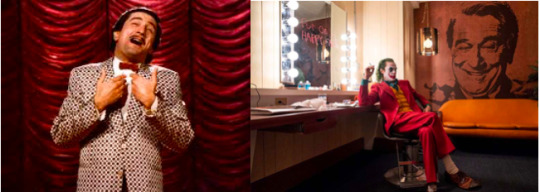
Arthur’s gradual transformation is foreboded by the way he exercises his mouth in a happy and sad smile in the opening scene. By doing so, Arthur reveals a myriad of emotions. He must, as any self-respecting clown, put a smile on his face but this one bears no warmth, no spontaneity. Its rigidity and exaggeration alternatively give way to alarming, threatening and desperate grins.
The duality expressed by the greek masks of comedy and drama displayed by Arthur is to be associated to his ever-present laugh. Right after his first assault on the street, Arthur is found sitting opposite a psychologist. The scene opens with Arthur laughing uncontrollably for a very long time. His laugh is anything but infectious and hearty. On the contrary, Arthur seems in pain while doing it. His facial features are distorted and uptight, his face tense as if he was about to cry. One can easily describe his laugh as bloodcurdling and disturbing; a laugh which is on the verge to choking him, even.
youtube
Just like the perverted clown figure which instills more pity and fright than buffoonery, Arthur’s bursts of laughter give away a real medical condition. Whenever Arthur is ill-at-ease, confused or bullied, he starts laughing madly and does seem unable to stop it. This condition is called pseudobulbar affect (PBA), which is a type of emotional disturbance condition, due to neurological disorder or brain injury, characterized by uncontrollable and often inappropriate episodes of crying, laughing, anger or other emotional displays. The scene that most exemplifies his mental disorder and extreme vulnerability is when Arthur entertains a little boy in the bus and his mother, misjudging the situation, asks him to stop. Taken aback, Arthur explodes in laughing, unable to control himself, and shows his medical card in an effort to explain what is happening. Combined with the beautiful but tragic film score, Arthur appears utterly powerless and crushed by inner and outer misery; a mental and physical misery materializing in a nervous laugh which makes everyone uncomfortable, including him.
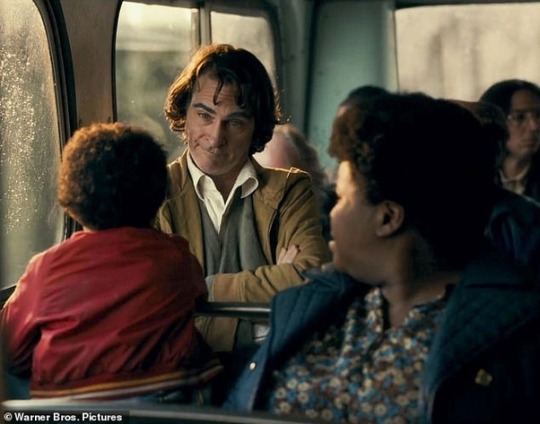
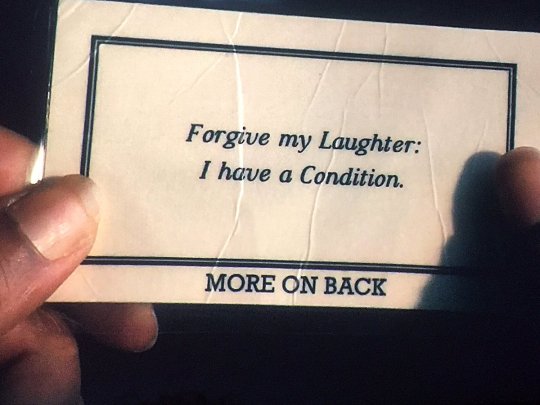
The therapy session provides a glimpse of the aggravating factors of the neurological disorder by capturing Arthur’s current psychological state. He is depicted as a deeply depressed and troubled man who takes many medications with no result. His persona as a sad clown is reinforced by a certain dark humour which he overuses in his notebook : « I just hope my death makes more cents than my life ».
As if Arthur’s traumatic life experiences were not enough, one finds out later that his PBA and awful thinness (see his protruding bones) are actually due to serious physical abuses inflicted, when he was a child, by his unstable mother.

In the end, one can conclude that the voice, as a narrative tool, is used in this film to anticipate, announce, hint at and explain Arthur’s journey to madness.
Contrary to traditional superhero films in which the villain’s tragic past is quickly mentioned, Joker builds its storyline precisely upon the villain’s progressive journey as a victim. And who is more likely to become a time bomb than someone who has been a victim all his life? The origin of the joker’s malevolence is to be found precisely in his traumatic experience of life.
The contrast between a kind and optimistic nature and the ruthlessness of a city and its inhabitants, reinforced by regular humiliations and family dramas, is enough for anyone to blow a fuse and turn to the dark side. But the Joker, considering who he is, puts a smile upon his face, finally embraces chaos - « Isn’t it beautiful? » he asks the policeman in a thrilling voice while on his way to prison» - and laughs at the irony of life, hence the ending. The piece of music, hummed by Arthur in front of the psychologist, concludes the film on a bitter note, its title underlining how unfair and unpredictable life can be: That’s life. But Frank Sinatra’s song is much more than an appropriate conclusion. By using the soundtrack as a diegetic and extra-diegetic music, Todd Philipps evokes both Arthur’s understanding of what he has been through all along and his ensuing thirst for revenge, fueled by injustice, the lack of meaning and the lack of a sense of belonging. Arthur’s smile, while humming, forebodes the joker’s rise of terror in Gotham city. Psychotherapy is over. It’s time for action! It’s time for his destiny to unfold…
That’s life… And as funny as it may seem, some people get their kicks, stompin' on a dream. But I don’t let it get me down cause this fine old world, it keeps spinning around…
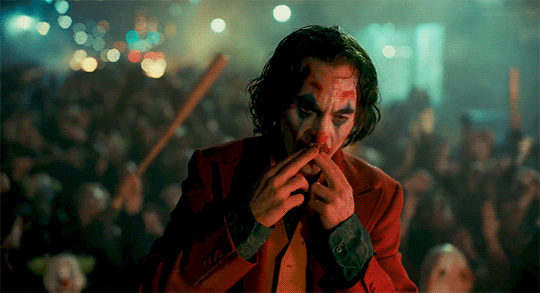
#joker#joaquin phoenix#laugh#*nervous laughter*#mental illness#comics#todd phillips#frances conroy#robert de niro#clown#terror#villain#batman#good and evil#film#cinema#super hero#psychological thriller#makeup#mask#the grinning man#gotham city#chaos#filth#political corruption#violence#delinquency#dirt city#irony#desillusion
15 notes
·
View notes
Text
Janice and the turn-off voice
youtube
Easily obsessed and disgusted by physical or behavioral imperfections (”Vivian too tall, Madge big gums, too loud, too smart, makes noise when she eats...”), Chandler Bing is a particularly picky guy when it comes to relationships.
What is probably the most hilarious and unforgettable turn-off of all the TV series is Janice’s annoying high-pitched and deeply nasally voice which makes everybody’s ears bleed. Her wicked witch laugh and famous trademark and ridiculously overdramatic cry of “Oh my God” make her sporadic but long-lasting relationship with Chandler even more baffling and comical.
youtube
#friends#chandler#janice#voice#annoying#highpitched#nasal#witch#laugh#oh my god#matthew perry#maggie wheeler#relationship#tv series#cult series
0 notes
Text
Ouija, Origin of Evil and the profane voice - Part I
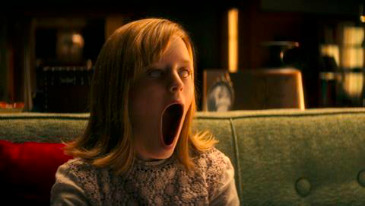
Though extremely shocking and disturbing, children happen to be at the core of major horror films. Samara in The Ring (2002), Dalton in Insidious (2010), Dany and the Grady twins in The Shining (1980), the children in Sinister (2012), Thomas in The Orphanage (2007) are among many other examples that prove the existence of an entire branch of horror cinema built on the mythology of the malevolent child. Why is the figure of the child so prevalent? Why should the most innocent and purest human beings be the main characters of films that are gruesome, violent and whose public age is strictly restricted? Precisely because their vulnerability and purity of soul make them easily influenced and manipulated by external forces. Besides, children are known to have an overwhelming imagination and a propensity to trust which are necessary to open the boundaries between the worlds of the living and the dead in accordance with the codes of the genre.
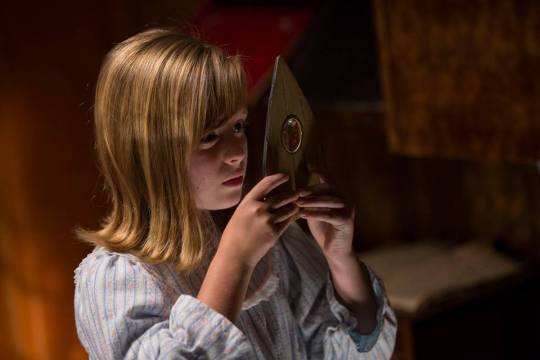
In addition to this, the more the prey is opposite to our expectations and subverts our beliefs of what is proper and what is not, the more the fright and fascination are potent. To consider a child as a monster, a killer or a possessed body is beyond our general understanding, hence the uncanny appeal of creepy children.
As pointed out by Alison Nastasi in her article published online on Hopes&Fears, this devious appeal for corrupted and murderous children portrayed in horror films might echo to « real-world fears about parenting, gender and social responsibility. »; a theory supported by Joe Dante’s comments about the subject : « Could it be connected to the fact that more and more parents have difficulty balancing work responsibilities [and] child-rearing (not to speak of nurturing their own relationships, personal and career aspirations) and are squeezed financially by the costs of raising children […]? Therefore, is it any wonder that children in genre movies are portrayed as powerful, disruptive, and uncontrollable? Perhaps these menacing moppet movies reflect the fears inherent in helicopter parenting—that the minute you take your eyes off your child, something dreadful will happen. » In any case, the films in question use the creepy kid trope in order to suggest that something is wrong, that the natural order of things is being shattered.
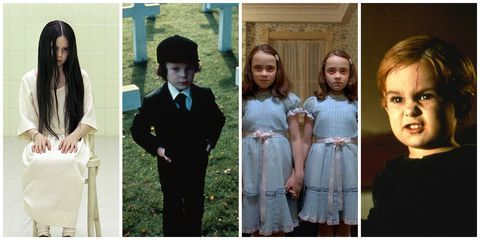
The corruption of innocence can take many forms but the most interesting one to study in relation to the narrative role of the voice in cinema is the threat of an invasion from the Beyond. In Ouija: Origin of Evil (2016), supernatural forces hold a young girl hostage by inhabiting her body and making it go through such transformations (vocal and physical) as to change it beyond recognition.
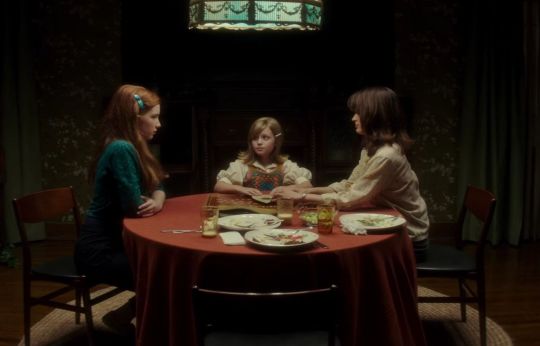
Taking place in 1967 in Los Angeles, Ouija: Origin of Evil tells the story of the Danzer family. Alice, a spiritual medium, is striving to make ends meet after the loss of her husband and father of her two children by hosting readings in her own house with the help of her daughters, Lina (15) and Doris (9). Running a declining scam business, in which Alice pretends to talk to the dead to bring closure to people and the girls help her out with tricks intended to make it all real, Lina suggests her mother to add a ouija board as a new prop to modernise her readings. The factitious dimension of the ritual which unfolds through the display of ingenious devices (stretchable table, a cupboard big enough to hide Doris, extinguishable candles…) is both an ironical comment on how fake spiritism is going to beat the family at their own game by revealing its true power and also a cleverly designed introduction to set the tone and build the tension.
All the ingredients are here to turn the ouija experience into a nightmare. The bereaved family is craving for a contact whatsoever with their loved one, little Doris first. She wishes she could talk to her father at a seance like other people do when they come and see her mother for help, that is why she does not talk to god directly but instead send prayers to her dad every night before going to bed. Contrary to Lina who is a teenager in complete denial and pushes down her feelings, Alice and Doris seek communication and are open to it, hence the evil befalling on them.
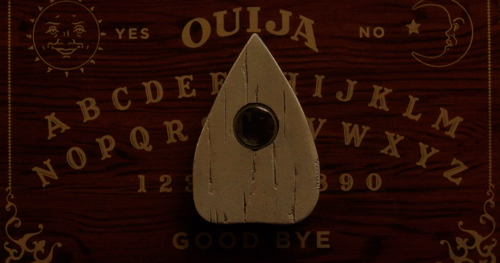
Portrayed as an angelic but lonely and bullied girl who is deeply grieving her father and believes in the blurry frontiers between the worlds of the living and the dead, Doris becomes the perfect human and tangible vessel through which supernatural forces can express themselves. All starts with the introduction of the ouija board as a prop into the house and with Alice breaking the three rules which are to never play alone, in a graveyard and never forget to say goodbye. At this very moment, Doris becomes inhabited by Marcus’s spirit whose identity is yet to be defined. How does this possession first transpire? Through speaking. Marcus uses Doris’s voice to start materializing and, as soon as she touches the board, the voices appear all around her, thus enabling the world of the Beyond to let in.
Doris is progressively attracted by the ouija board which makes her believe she is talking to her father, Roger. They are deceitful spirits who do everything to earn her trust to better trap her, hence the hint at the money buried in the cellar. Contrary to Lina who is far from being fooled, Alice thinks her youngest child is gifted and asks her for help. As the readings follow one another, the trap is closing in around Doris who starts feeling pain in her neck at the same time she excels in the occult. She can now reproduce the voice of the deceased summoned during the seance.
Once she is fully possessed, Doris first goes through a radical physical and behavior transformation by becoming lethargic, stolid, her eyes often turned white when no one is watching her. Besides, her vocal abilities also go through creepy changes. In addition to mimic the deceased’s voice during the readings, adults’ voices, Doris keeps whispering in people’s ears in a demonic way when the evil entity starts spreading its malevolent influence on the whole family.
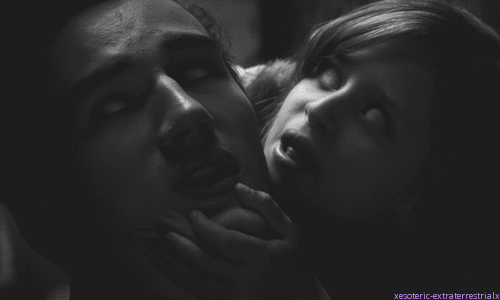
When the film reaches its climax and Doris fully assumes the devil’s voice, which is guttural, otherworldly and distorted by hatred, she no longer is a young innocent child. Marcus’s spirit corrupts and perverts Doris to achieve revenge by desecrating her body and soul and making her utter bloodcurdling things. The scene which most epitomizes the figure of the violated child is when Doris explains step by step to Lina’s boyfriend how it feels like to be strangled to death. The most uncomfortable thing about it is to witness the contrast between what she says and the sweet voice in which she says it with an angelic smile on her face. The mise-en-scène that keeps stressing Doris’s vocal changes, by shooting her facing the camera (or the fourth wall) as if she was already part of the Beyond, is meant to emphasize the element through which she is channelling these powers and forces : the mouth.
youtube
The mouth as an organic element stands as a kind of leitmotiv throughout the film inasmuch as the possession of Doris’s body and soul by the demonic entity is made complete through that means. One night, Doris is awakened by her pain in the neck and gets assaulted by a dark creature who thrusts his devilish arm into her throat. This shadowy creature, one can notice, has no mouth or rather a distorted sewed one, similar to Lina’s mouth when she looks at herself in the mirror one night. At the light of these elements, what was supposed to be a nightmare was in fact real and prophetic.
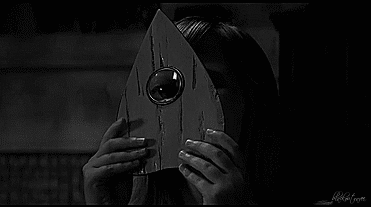
But what can be the meaning of the recurring imagery of the sealed mouth (see also Lina’s doll)? Who is Marcus? Why is he portrayed as an evil spirit? What does he want from Doris and her family? He clearly states his purpose when trying to possess Lina’s soul : to snatch her voice.
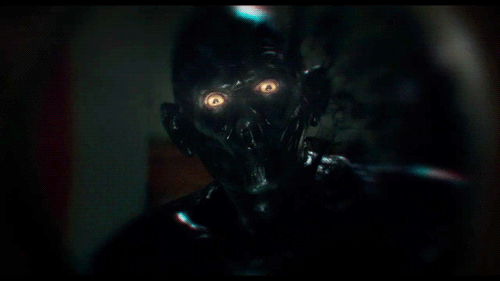
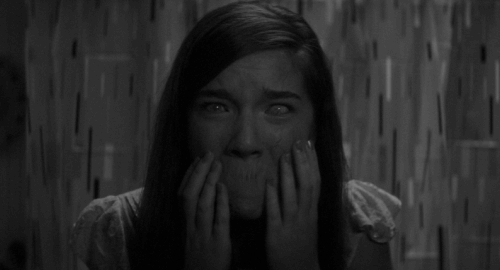
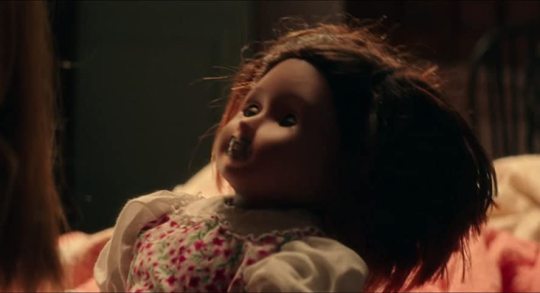
Father Tom Hogan, a friend of the family, is the one who uncovers the ugly truth behind Doris’s pretended benevolent gift of clairvoyance. She is not channelling good forces but Marcus’s spirit, a man who happened to have been mutilated and murdered in this house a few decades ago. After the second world war, a twisted nazi doctor, called the devil’s doctor in the camps, escaped to America where he succeeded to get hired in a mental institution. He went on practicing his sadistic experiments on patients in the basement of his house. In order to do it, he cut out their tongues, severed their vocal cords and sewed their mouths so that no one could hear them from above. However, Marcus’s story does not end with his death. Violently murdered, he never rested in peace but instead was doomed to wander in the cold darkness of the underworld among other desperate, voiceless souls and malevolent creatures who must have been summoned by the doctor who was into the occult.
In the end, Marcus, who has been silenced by force, deprived of his own voice and overtaken by the surrounding evil influence in the Beyond, seeks revenge against god and people who have the ability to express themselves, eaten away as he is by hatred, frustration and pain. The only way for him to exorcise the horrible things he has been through is to communicate and hurt others, but for that a voice and a body are needed, hence his attempts to snatch the family’s voices. That is the only way to be heard and to have an influence outside his doomed world. Helped by her father’s good spirit, Lina grabs needle and thread and silences her sister for ever, thus fighting hard against the entity who strives to engulf her.
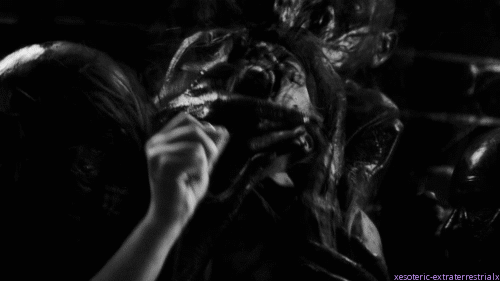
Ouija, Origin of Evil, like many other horror films, uses the voice and its communicative powers as narrative tools to address issues and challenge notions such as grief, loss, family unity, parenting, revenge, alternative beliefs, suffering, innocence, corruption, violation and religion. Religion…such a crucial theme whose set of practices and beliefs makes it the most cherished subject of the genre. Any idea which emblematic film is yet to be analyzed in the perspective of the profane voice and corruption of innocence?
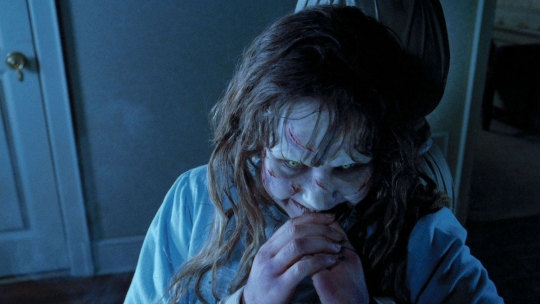
#ouija#ouija origin of evil#horror film#ouija board#mike flanagan#elizabeth Reaser#annalise basso#lulu wilson#henry thomas#devil#spiritism#occult#voice#profanation#lina#doris#mouth#creepy children#cinema#supernatural#whispers#religion#film analysis#child#innocence#revenge#grief#loss#soul#voiceless
23 notes
·
View notes
Text
Us and the voice of dystopia
Jordan Peele’s latest film, Us, is as uncanny and disturbing as his first movie Get Out which proved itself to be a cinematic feat at the time of its release in 2017. Rightly considered as one of the fathers of the horror film renaissance (see also Ari Aster), Jordan Peele has been succeeding not only in addressing societal issues and in adopting a critical stance toward his home country but also in injecting an artistic vision in what is unfairly and generally regarded as second-class films.
In Us, Jordan Peele’s strong sense of composition and framing reveals the main theme of the film : the duality of human nature through the evil self. Nothing revolutionary so far. Many films of the genre have explored the mythology surrounding the figure of the doppelgänger from multiple angles. For example, Alfred Hitchcock’s and Darren Aronofsky’s use of the double has a psychological bent; to dig through Scotty’s perverse psyche in the haunting Vertigo (1958) and to explore a mental illness in Black Swan (2011), whereas in The Great Dictator (1940), Charlie Chaplin chose to play both Hynkel and the Jewish barber for satirical purpose. In Us, nothing of the sort. Remember what we said about Jordan Peele’s films? About how the horror genre disguises social subtexts? But before aiming at the true meaning of this human mirror, one should focus more on the narrative use of the voice which proves to be of utter importance to understand what is at stake, because if you really listen to the voice, you understand the whole film.
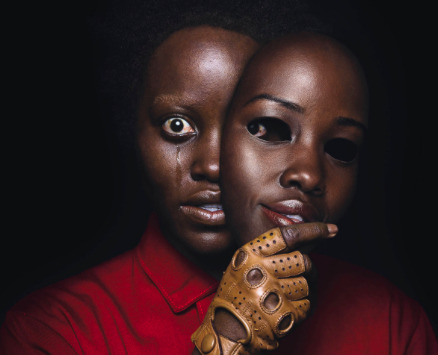
Us tells the story of Adelaïde Wilson’s family who goes on holiday at the seaside in Santa Cruz. A series of strange coincidences reminds her of the trauma she experienced there when she was a little girl while vacationing with her parents. She made a disturbing encounter in the hall of mirrors of a funhouse. She came face to face with a little girl who looked just like her. After this event, she could no longer speak for a while because of, it seems, a post-traumatic stress disorder. At present day, overwhelmed with fear, she confides in her husband about her past. The same evening, they discover four people standing outside their house, their doppelgängers. Ruthlessly hunted, the Wilson family will have to look inward in order to counter their own selves.
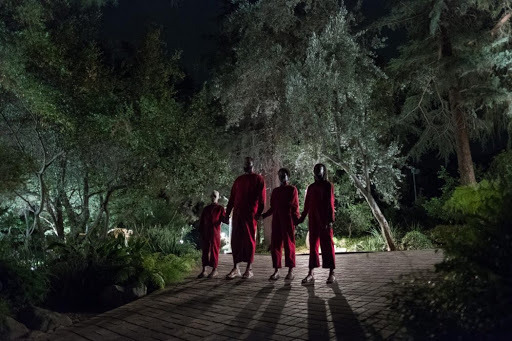
What strikes first when they all meet is that Red, Adelaïde’s double, is the only one who is able to speak, or rather utter words. She is struggling with very word she says, as if her speech production was failing her somehow. When she starts speaking, her voice happens to be hoarse, cavernous, husky, strained, even choked. Her disorder of phonation makes her voice otherworldly such as of a creature’s coming straight out of hell. It feels like she is not used to talk, actually that this is the first time she tries to pronounce and articulate words to create sentences. In this perspective, it is worth stressing Lupita Nyong’o’s astonishing work to produce Red’s chilling croaky and guttural voice. She used spasmodic dysphonia to make a creepy voice, that is a neurological disorder that causes involuntary breaks or interruptions in the voice due to an irregular flow of air. This language impairment, however, does not prevent Red from telling her story; the story of a dystopian world.
youtube
Red and Adelaïde are two sides of the same mirror. One learns that everything Adelaïde does is mirrored and has an impact on Red’s life, only the other way around. Everything that is happening in Red’s life is a pale copy of Adelaïde’s achievements and takes on a nightmarish dimension. Red’s husband, Abraham, is rough and dumb; her daughter, Umbrae, is born laughing and her son, Pluto, is a dangerous arsonist. The ideal family meets the poor and sad version of themselves who now claims justice through revenge, hence the imagery of the good and evil self.
Throughout the film, the mise-en-scène keeps referring to the double as a warning or rather a prophecy as to the coming of those doppelgängers clad in red jumpsuits, which strangely resemble the clothing of prisoners. The clues left by the director are the following ones : the twin sisters of the superficial WASP family friends, the shadow of each member of the Wilson family projected on the sand while they are walking on the beach, the recurring number « 11:11 » featured here and there (an extract from the Bible, Jeremiah 11:11), Jason wearing a mask (maybe a reference to the iconic masked murderer of Friday the 13th whose name is Jason?), Jason’s drawing showing a kid who looks just like him, a toy plastic spider behind which a true spider appears crawling across the low table of the living room, and of course the daze of mirrors.

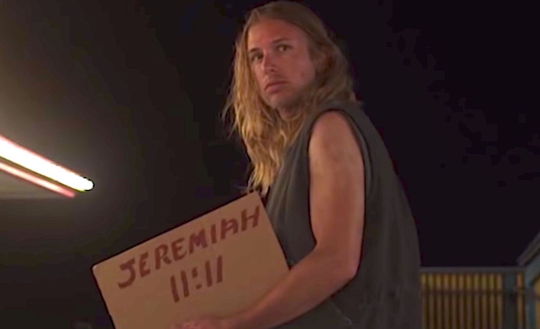
All those elements evoke duplicity and foresee a parallel world unknown so far. Red’s voice, alone, embraces all that imagery and embodies the punitive prophecy hidden behind the verse from the Old Testament book, the Book of Jeremiah, whose verse alludes to God’s wrath : « Therefore thus saith the Lord, Behold, I will bring evil upon them, which they shall not be able to escape; and though they shall cry unto me, I will not hearken unto them. » The invasion of the doppelgängers across the world is a divine plague orchestrated by Red from the underworld to take revenge.
In fact, what the film tends to reveal all along is the existence of an underworld located inside « the thousands miles of tunnels beneath the continental United States », which are « abandoned subways systems », as stated at the very beginning of the film as an introduction. Those subways are inhabited by people who are the product of a failed governmental scientific experiment designed to replicate the bodies of those above to manipulate them. However, they discovered that the « soul » could not be duplicated, hence the repudiation and neglect of that population now doomed to survive below the Earth’s surface, with raw rabbits as sole source of nourishment, and to « act out grim recreations of their respective partners’ above ground actions like sad little marionettes. »1 The scientific dimension of this governmental conspiracy is foretold in the opening credits by the camera progressively zooming out the caged rabbits. This shot conveys the idea of a sanitized laboratory. The existence of two opposite worlds is also mentioned by the shot which shows the funhouse twice, by night and day (darkness and daylight).
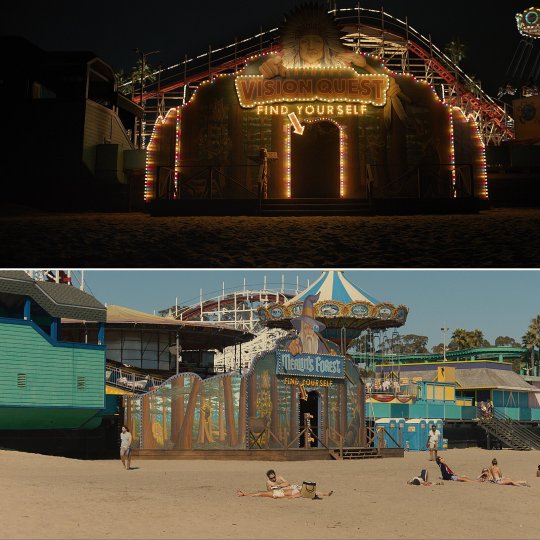
The organised overthrow, which takes as an example the Hand Across America charity campaign of 1986 (giant human chain), can be interpreted in many ways : an uprising against social inequalities, such as racial, gender and salary based discrimination, which undermine the U.S (or Us); a country where climbing in the social ladder is more and more unattainable for under-represented ethnic minorities. It can also be seen as a denunciation of what America has become, unfair, poor and divided; a denunciation of the famous ideology of American exceptionalism through the ostentatious display of American symbols distorted by the horror genre. The « tethered » are done being downtrodden and ostracized. They want to embrace the American myth that had been promised to them by taking their rights back and by building a new world, hence Red’s assertive reply to Gabe’s question « Who are you, people? » : « We are Americans. » They claim themselves as being true Americans (to be connected to the Native American reference of the original funhouse’s sign), free from all materialistic concerns.
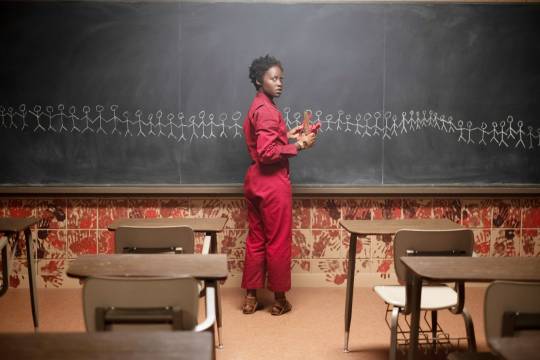
Only, this does not constitute the twist ending of the film. Like all self-respecting horror films, Us is no exception in the matter and does offer a shocking one. And this is the voice which hints at it all along and that turns upside down the government’s theory about their human experiments.
Red’s whistling while walking up the alley of the Wilson’s family with a pair of scissors in her hand in the dark is where the truth really lies. If one has well paid attention to the details, one would have noticed that Adelaïde whistled the same way when she was trapped in the hall of mirrors when she was a young girl, as if to ward off the coming threat. Do you see my point? Why is Adelaïde so reluctant and does have trouble engaging in a conversation with Kitty on the beach? Why would Red be the only tethered to be provided with the ability to speak? Why this eager for revenge? Because Red actually is the true Adelaïde. Back to the funhouse in 1986, young Adelaïde’s clone, Red, was lured to go to the surface as Adelaïde progressively approached to her tragic destiny.
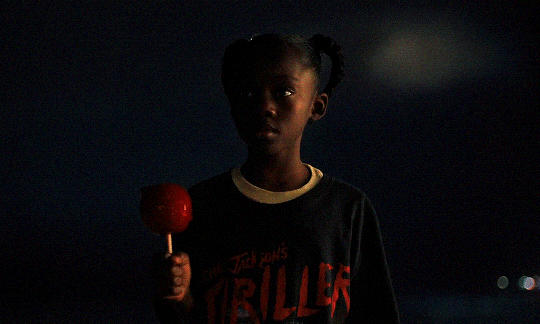
What the film did not show is that Red strangled Adelaïde until she fainted, dragged her down the tunnel, attached her to her bed in the dormitory and switched place with her among Adelaïde’s family, hence her early language deficiency. While Red grew up like a normal little girl and learned how to speak, Adelaïde lost progressively her language abilities growing up among zombie-like human beings, which proves that the government’s theory is wrong. The soul cannot be duplicated but this does not mean that the tethered are « soulless creatures ». If given the chance, as Red has had, the tethered would have turned out perfectly okay. They would have followed the regular human evolution process called « hominisation » or « anthropogenesis », the process of becoming human. Indeed, the doppelgängers all look like primitive animals. Pluto, by his gesture, reminds of a monkey-like primate’s attitude and Abraham’s moans, groans and grunts are those of Cro-Magnon man. Their names evoke ancient times, something rough yet to evolve, and the mythology of the doppelgänger, Pluto being the god of the underworld, Umbrae the latin word for shadow. Abraham is the « Father of the nations » which can be connected to the human chain the tethered seek to initiate to rise up and find they own humanity. Red’s name could refer to the color of the tethered’ garments, and thus evoke the state of imprisonment which they have been reduced to until now.
In this perspective, Red’s voice is not only the voice of dystopia but goes far beyond this sole and somewhat manichean opposition which is the driving force behind the narrative of the film. Red’s voice, by also being the voice of anthropological evolution, mainly serves to establish a connection between the latter subject and the current state of American society. With no equality of opportunity, people cannot equally seek higher social and intellectual status and end up being the slaves of the system. America has now no other choice but to drop her delusions and take her mask off.
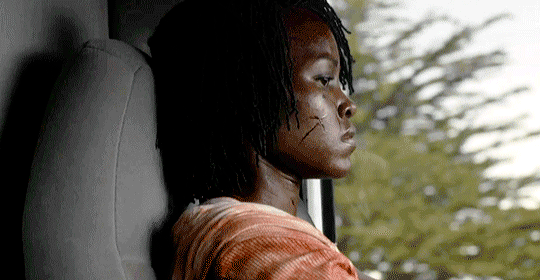
1 Bojalad, A., (2019, March 22). Us, Hands Across America, and the failed American experiment. Retrieved from https://www.denofgeek.com/movies/us-jordan-peele-hands-across-america/
#us#jordan peele#red#umbrae#abraham#pluto#lupita nyong'o#horrorfilm#doppleganger#evil self#the tethered#get out#dystopia#elisabeth moss#winston duke#shahadi wright joseph#evan alex#handsacrossamerica#scissors#double#clones#funhouse#hall of mirrors#rabbit#spasmodic dysphonia#voice#jeremiah 11:11#croaky#hoarse#american exceptionalism
2 notes
·
View notes
Text
Snatch and the unintelligible voice
Every accent tells a story; a story of geographical, cultural and social belonging which can inspire authors in the writing of film characters. But sometimes, an accent happens to go beyond the mere reflection of national identity. More than a territorial delimitation, an accent or a dialect is a phonetic phenomenon that possesses its own melody, phrasing and rhythm. These particular features make it an easy target for caricature. Either strong, distorted or exaggerated, an accent, as a comical device, is always effective. In Snatch (2000) by Guy Ritchie, Brad Pitt’s portrayal of the Irish Traveller accent is so extreme that his language becomes undecipherable, and consequently absurd.
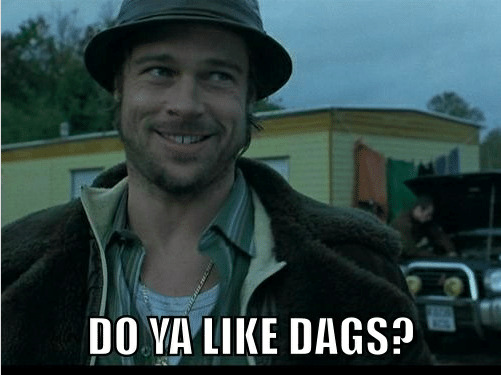
It is said that Brad Pitt’s unintelligible language was a narrative bias meant to counter criticisms about the thick accents of the characters in Guy Ritchie’s previous film Lock, Stock and Two Smoking Barrels (1998). Indeed, by sharpening the roughness of the northern way of speaking and by caricaturing the Pikey language, the director probably wanted to play the provocation card but also to assert his filming style that places emphasis on a very British humour. It is also said that this particular way of speaking was born from Brad Pitt’s inability to mimic accents and Guy Ritchie’s ensuing decision to let him improvise.
In either way, Brad Pitt gives such an extraordinary performance that today the film is mostly remembered for it. Mickey O’Neil, also called « one punch » Mickey is an Irish Gypsie known for being a bare-knuckle boxing champion. First approached by a boxing promoter, Tommy, and his mentee, Gorgeous George (Adam Fogerty), sent to purchase a caravan from his people, Mickey gets quickly involved in fixed fights but seems unable to go down when supposed to. He is a crazy, unpredictable, restless and uncontrollable man but also a mama’s boy who is deeply committed to his community.
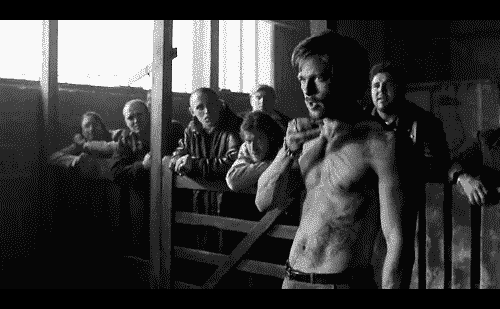
However, Mickey O’Neil is a character who strikes less by his extravagant behavior than by his linguistic attributes. Literally shaped by his baffling language, Mickey is identified from the beginning as not understandable by Turkish’s voice over : « You can’t really understand much of what is being said. » This does create hilarious scenes in which Tommy (Stephen Graham) and Turkish (Jason Statham) hardly understand a word he says. The «caravan talks» perfectly portray the Pikey language in all its linguistic uniqueness. It is characterized by a mumbled and inarticulate enunciation whose effect is made worse by an extremely quick and rushed diction. It feels like they all swallow words up in a jerky way. The result is that one can only catch bits of conversation.
This language exaggeration might be due, in part, to the community’s suspicion towards outsiders. Victims of numerous prejudices (theft, fraud...), Irish Gypsies are known to be in the habit of muddling their speech, making terse utterances and speaking quickly to conceal meaning from others. Unsurprisingly, the term « Pikey » is actually a pejorative, slang word for Shelta, Cant, Pavee or Gammen. The way it is described by Turkish even suggests that it is no more than a weird dialect, something in-between as if it was not a legitimate language: “It’s not Irish, it’s not English, it’s just, well... it’s just Pikey.”
youtube
youtube
Thus, Mickey is « tagged » as talking gibberish in addition to knocking his adversaries out in one blow. In Snatch, every character is labeled and acts as such throughout the film: « Brick Top »’s speciality (Alan Ford) is to smash people. He is a sadistic mafia boss who keeps threatening and killing people. Boris « the Bullet Dodger » (Rade Serbedzija) is tough. He doesn’t die easily.
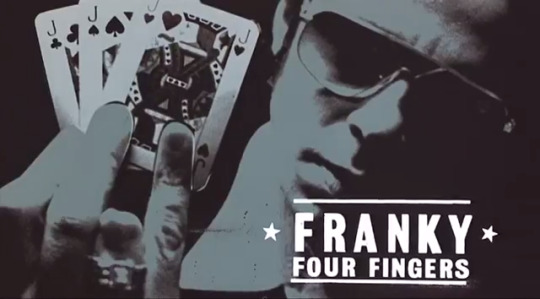
The characters’ itineraries are shaped by this stereotyped identification. What is also interesting is that these distinctive features are both a strength and a trap. Brick Top’s violence serves him well until he gets killed and Boris seems invincible until he gets riddled with bullets. As for Mickey, he is punished for his recklessness as his mother perishes in an arson attack orchestrated by Brick Top, but ironically enough, Mickey is the one who has the last say in all this. To everyone’s surprise, he puts an end to Brick Top’s reign of terror by trapping and killing him after a boxing fight. He does get his vengeance, free Turkish and Tommy and leave with the diamond everyone was fighting for.
Though not taken seriously and laughed at for his gibberish, yet Mickey is the one who clears the whole mess up, which makes him a much more central character to the story than expected. One could even argue that Mickey’s funny accent and the ensuing comical situations were meant as a narrative diversion in order to mislead the audience (and also the characters) and create a twist ending.
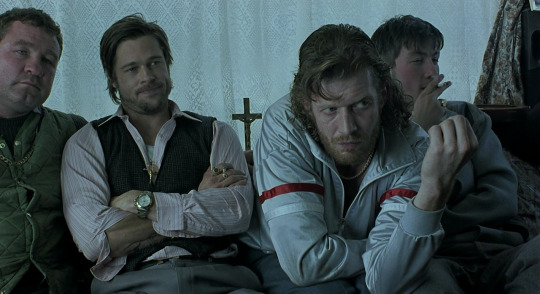
#snatch#guyritchie#bradpitt#pikey#gypsy#britishhumour#boxing#shelta#dialect#accent#mickeyoneil#bricktops#boristheblade#caravan#irishtravellers#turkish#tommy#gorgeousgeorge#absurd#boristhebulletdodger#jasonstatham#alanford#stephengraham
5 notes
·
View notes
Photo
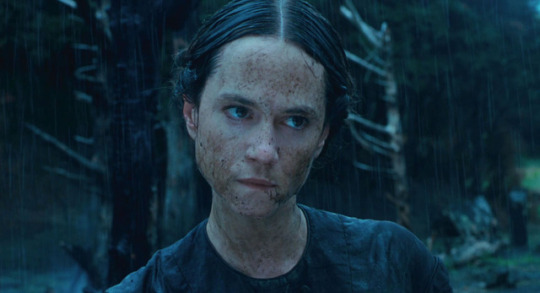

Ada’s deafening silence... By chopping his wife’s fingers off in a fit of rage, Alistair crushes her last means of expression and escape, making her incapable of playing the piano.
(The Piano, Jane Campion - 1993)
0 notes
Text
The Great Dictator and the voice of (in)humanity
Once upon a time in Tomania was a very short man with a dodgy moustache who dreamt to rule the world and populate it with innocent blonde cherubs with big blue eyes. To make this dream come true, Hynkel, fervent defender of the lofty ideology of pure race, needs to erase the greedy creatures with hooked noses from the magical land of Tomania, that is the Jews. In this fairy tale, everything seems to be proceeding as planned until the day an amnesic Jewish barber, bearing an uncanny likeness to Hynkel, comes back to his barbershop in the Jewish ghetto.

From the very beginning, Chaplin sets the tone of his film by barely denying the direct reference to Hitler and his regime in order to better prepare his audience to the oncoming satire, hence the fictitious countries of Tomania and Bacteria, the laughable substitute names (Herr Garbitsch/Garbage, Adenoïd, Napaloni) and the following note: « Any resemblance between Hynkel the dictator and the Jewish barber is purely co-incidental. » Here, the satire genre is meant to show the absurdity of such a character’s ideals and fantasies. Without underestimating the tragic consequences of Nazi ideology, Chaplin wishes to desacralize Hynkel/Hitler by making fun of his vices and shortcomings in order to reveal who he truly is: a ridiculous self-centered maniac who took advantage of the economic crisis and desperate people of his country following the First World War. The scene which epitomizes the most Chaplin’s mastering of political satire is surely the scene of Hynkel’s public speech.
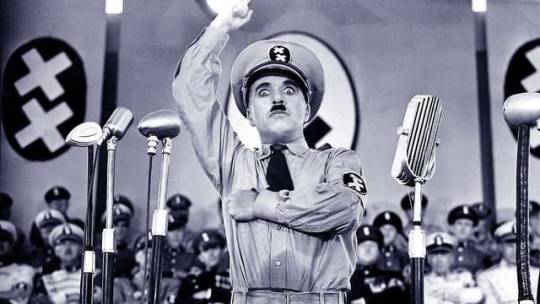
Known for his expressive bodily gesture, infuriated speeches and harsh German accent, Hitler’s behavior and outer appearance are easy targets for caricature and are used as such by Chaplin. But for the very first time in his career as a director, Charlie Chaplin performs a caricature using the evocative power of the voice. This is indicative of the major stakes involved in the making of such a film. Released right during the Second World War (1940), The Great Dictator is not just a first talking film but a historically significant one which resonated with the international political climate of the time, that is the rise of Fascism in Europe, and contributed to the Allied propaganda as a self-consciously political statement. The narrative role of the voice here is not only to characterize Hynkel’s oratory style but also and most importantly to explore what it is exactly that makes him terrifying and mesmerizing. Is it his gestures? His facial features? His looks? Or else his general attitude? Probably a bit of all that. But if one pays closer attention to the way Hynkel’s voice is portrayed throughout the film, one cannot but notice that the voice plays an even more crucial part in the creation of his persona.
youtube
Following the press titles about Hynkel’s rise to power, the first thing the dramatic male voice over announces is the suppression of free speech in Tomania in order to better emphasize Hynkel’s monopoly in this matter, thus already conveying the idea of a voice so powerful that it silences, even crushes all the others: « […] and only the voice of Hynkel was heard. » No wonder that what comes next is Hynkel’s public speech. Surrounded by a ridiculous number of microphones of all sorts, Hynkel starts speaking in an imperative tone. His face is severe and his movements frenetic. Facing the camera, Hynkel creates a sense of urgency in the audience by speaking loudly and ferociously, by reproducing a harsh diction and also, by adopting an authoritative bodily gesture. His brusque arm movements slice to the air like a sword and his fist clenches in a threatening way in order to give weight to his clearly hateful speech. Hateful and threatening it must be as even the microphones back off under Hynkel’s enraged snorts and roars during his vitriolic diatribe against the « Juden ». One of them literally bents backwards while the other spins around itself in response to Hynkel’s furious spits.

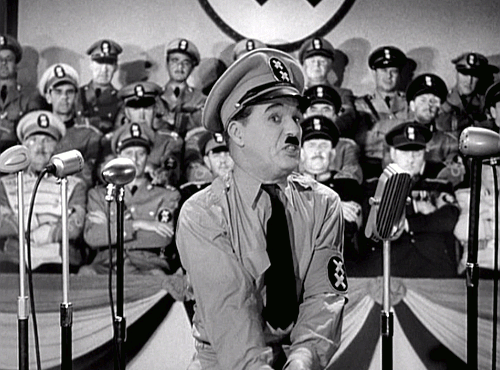
In truth, the satirical dimension of the speech originates less from Hynkel’s extreme bodily gesture, Chaplin flawlessly imitating Hitler in that regard, than the director’s skillful manipulation of his voice. Indeed, the comical devices that fuel the satire target mainly Hynkel’s voice. By fiercely insisting on each word he says, Hynkel is always on the edge of choking, as if he was choked by his own hatred. This results in a very comical situation where his coughing becomes an extension of his speech through its rhythm and intonations. Exaggeration, words repetition, funny sounds (especially the German « ü » and « str », the sound « z »), and wild intonations are all comical devices meant to ridicule him. As it turns out, Hynkel’s speech is nothing but absolute gibberish, « a series of fits and starts, of coughs, splutters, and sibilants, with occasional identifiable words like Wiener schnitzel and sauerkraut. » Chaplin purposely invented a fake language inspired by a mock German for this film to reinforce his caricature.
This stylistic bias goes hand in hand with the partial translation given by the English interpreter; « partial » because not faithful to the original speech. While Hynkel blathers his long speech in front of the crowd, using an emphatic and sensationalist tone, the interpreter simply summarizes in a few words, which does create a narrative gap whose satirical power arises from his euphemistic wordings, blandly impassive tone and brief translations: « Herr Hynkel just said: yesterday Tomania was down but today she has risen », « His excellency has just referred to the Jewish people. » It is obvious that he said well more than that. Those comments reinforce the ideas of censorship and suppression of free speech under Hynkel’s regime. The interpreter is expected to embellish the speech (« Democracy is fragrant. Liberty is odious. Freedom of speech is objectable », whereas Hynkel says « stinks ») and minimize its racist insinuations. One of the reasons why it is so funny is because Chaplin counteracts our expectations as spectators. After such a tense speech, one expects the same length and emphatic tone, if not the exact translation, even if Hynkel’s snorting, spitting and threatening movements are enough to convey his hatred. The same kind of speech discrepancy is to be noted later in the film when Hynkel dictates a letter to his secretary. The more he speaks, the less she writes and vice versa. It is as if language itself offered some sort of resistance. The interpreter’s only faithful translations happen when Hynkel glorifies Tomania and when he describes what is seen on the screen, which is utterly irrelevant: Hynkel tightening his belt, Hynkel addressing himself to Herring and Garbitsch. The satire’s climax is when the interpreter asserts Hynkel’s good intentions: « In conclusion, the Phooey remarks that for the rest of the world he has nothing but peace in his heart. »
youtube
On further consideration, without his powerful voice, Hynkel would not be credible gesticulating the way he does. As a matter of fact, « Hitler […] was known for his speeches, but looked ridiculous in silent newsreels, where his exaggerated mannerisms played more to laughs », as Bilge Ebiri points out in his article published online on Vulture in December 19, 2014. That’s why Hynkel’s speech is reduced to a mere German-sounding gibberish: to better emphasize his ridiculous gesticulation. Similarly, the ghetto scene, in which the Jewish barber keeps pace with the dictator’s voice coming through loudspeakers, supports this idea by staging a disembodied voice amplified by the technical device of loudspeakers. It is precisely because it is disembodied that the voice has a stronger effect.
While Hynkel’s speech demonstrates a pure exercice of political criticism openly intended to shame the fascist dictator and his regime, the final speech delivered by the barber, Hynkel’s doppelgänger, works as a mirror scene whose aim is to fire back by spreading a message of hope, freedom and peace.
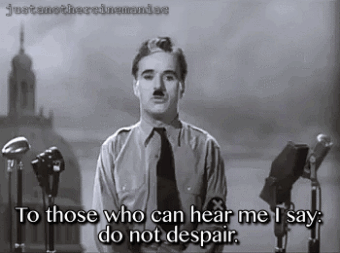
Through a series of circumstances, the Jewish barber, fully dressed as Hynkel, ends up being mistaken for the dictator and asked to speak publicly on the occasion of the invasion of Osterlich. Everyone is waiting for him. The terrified barber, having no other choice but to try to impersonate Hynkel and give a speech, goes up the stairs as if he was going to the gallows, hence the solemn and fateful drum roll. Herr Garbitsch precedes the barber on stage to declare that « democracy, liberty and equality » are to be abolished as they « stand in the way of action » and are only « words to fool the people. » He states that Jews and any other non-aryen people are inferior and thus enemies of the nation. Contrary to Hynkel’s speech, Herr Garbitsch’s is not meant to be funny. For the first time in the film, this bloodcurdling speech is meant to reflect and reveal the Nazi ideology in all its ruthlessness and dreadful disenfranchisement of an entire population.
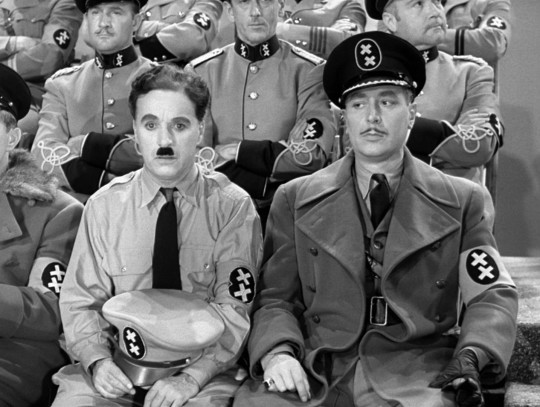
Outraged by these words of despair, hatred and servitude, but struck by Schultz’s evocation of « hope », the barber gets behind the microphones, transcended by the obviousness of what he is about to say. The music which goes with the sudden awareness displays an enchanted, almost-divine melody which associates this awareness to an epiphany. The gentle, airy tones of the violins convey an idea of appeasement but also something of universal that goes beyond the troubles of the present time. This music foreshadows in itself the tone of the barber’s oncoming speech. Completely stunned, the barber stands, humble, before the crowd and starts an impassioned plea for brotherhood, goodwill, democracy and unity. After slowly starting his speech, the barber gets quickly engrossed in what he is saying until reaching the culminating point at which he calls upon the solidarity of his fellow citizens to restore faith in humanity.
youtube
The situation is critical. There is no room for mockery, satire or comical lags. Based upon a Manichean view and the rhetorical device of antithesis to achieve a contrasting effect, the barber’s plea against dictatorship is made of three major parts. The first statement is idealistic. It dismisses the very notion of conquest in the form of enslavement while promoting the notions of diversity and peace between communities. The second statement crushes this ideal world by listing the vicious traps people got into. It blames the greediness of men for what is happening and points out the excesses of human progress: « We have developed speed but we have shut ourselves in. Machinery that gives us abundance has left us in want. Our knowledge has made us cynical, our cleverness, hard and unkind. We think too much and feel too little. » The barber goes on by revealing what should be the positive counterpart of those achievements, that is more humanity and understanding. As for the last part of the barber’s speech, its purpose is to give hope and faith in human nature despite this moral crisis, ensuring its transient nature. In an inspiring moment, the barber urges people to rise against oppression, to remain united, to fight against adversity and for their dignity long gone under a dehumanising system. This speech is a universal plea in favor of human emotions and sensibility. The barber appeals to people to maintain their humanity. Chaplin structures the barber’s speech around the notions of humanisation and dehumanisation. Humanisation implies a « world of reason », « a world where science and progress » are means to achieve happiness, not to destroy it; whereas dehumanisation implies brutality, enslavement, tyranny, alienation and mental conditioning, whose the repetition of the word « machine ». To make his point, Chaplin opposes the « machine man », devoid of any sense of morality and freedom of thought, to human being, who is the only future of mankind. The machines must serve the people to do good and not dictate their behavior and thinking. That’s why Chaplin, mirroring the dictator’s speech, backfires on him by using the radio system in the right way this time: to reach out to million of people around the world and spread a message of hope: « The very nature of these inventions cries out for the goodness in men, cries out for universal brotherhood, for the unity of us all. » With this speech, the barber makes himself the voice of humanity.
youtube
The barber’s speech still resonates with today’s society, thus reinforcing its universal reach. In his six-minute song Iron Sky (2014), Paolo Nutini, a Scottish soul rock singer and musician, literary quotes a whole episode of it. After two verses and two refrains, Paolo Nutini stops singing and gives way to the recognizable barber’s voice that is heard with background instrumental music (electric guitar and cymbals). Like a dreamy parenthesis within the song, this homage works as a poetical addition to it, giving more strength and depth to the story it tells. Though set in a totally different political context and interpreted in multiple ways, the sample here seems to refer to the alienating dimension of our modern society that tends to replace human beings by machines to reduce labour costs and optimize efficiency:
« The world throws up new meanings for that one every day, but it's mainly that man-versus-machine thing. You know: you go into WH Smith these days and they steer you to the electronic checkout. I always think: 'Why so calm?' Don't you realize that thing that doesn't have a family to feed is going to have your job? » (Paolo Nutini from The Independent)
Normally, eloquence is one of the dictator’s most powerful weapons but in Chaplin’s rewriting, language challenges arbitrary power, hence the language mismatches, fake German, substitute names, and voice effects. By comically turning against the dictator his own tools, Chaplin undermines the credibility of such a character’s persona and questions the very essence of his tyrannical power. The voice of inhumanity is supplanted by the voice of humanity which, unlike the unintelligible German-sounding language, is clear, straightforward and sensible.
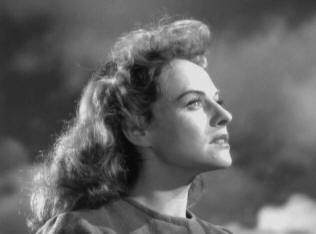
#the great dictator#charlie chaplin#hynkel#jewish barber#tomania#caricature#political satire#nazism#talking film#paulette goddard#second world war#bacteria#herr garbitsch#speech#universal#peace#hope#humanity#paolo nutini#iron sky#comedy#film#united artists#Meredith Willson#dictatorship#jack oakie#commander schultz#comedy drama film#reginald gardiner#oratory style
0 notes
Text
The King’s Speech and the voice of insecurity
Speaking with eloquence has always been associated with power and self-confidence. The power of attraction, over people’s mind, of a steady voice, articulating a well-thought speech imbued with rhetoric, is such that the ability to captivate an audience through speech has become the hallmark of the leaders of this world. Ruling is all about reaching people and convincing them of one’s legitimacy.
In this regard, the 20th century dictatorships knew exactly how to get people to adhere to their ideology. Through mastering the means of communication at their disposal (spectacular parades, emphatic public speeches, written and visual propaganda), dictators succeeded in brainwashing a whole nation, thus using oral speech as an implacable manipulative weapon.
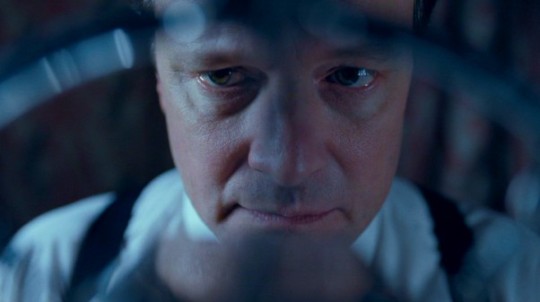
One of the scenes in The King’s Speech precisely refers to the crucial role played by public speech in the rise of Nazism by showing Hitler delivering a strong speech during a public appearance. The Duke of York, George V’s second son, is jealous of the dictator’s ability to show self-confidence and conviction on stage. Hitler creates a sense of urgency in the audience by speaking loudly, by showing a perfect diction and by adopting an authoritative bodily gesture. Like a sweet lullaby, a speech can decrease one’s vigilance and fill one’s mind with illusions provided that it plays on the sensitive string.
Without effective communication tools, such as the ability to express oneself properly and with conviction, a leader sees his influence decreased, his credibility shattered and his public image tarnished. This is exactly the whole challenge of the film, that is showing the paradox of being a stuttering soon-to-be king. How can he expect to fulfill his royal duties when his stuttering makes him the laughingstock of a whole nation?
The theme of a king who struggles to overcome his language impairment is not only at the core of the storylines but also a challenge, throughout the film, in terms of mise-en-scène.
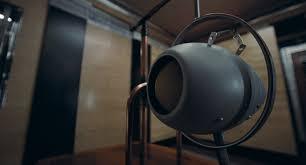
The film is literary haunted by the physical embodiment of the future king’s fears: the microphone. Right from the start, the film opens with a closing speech to be delivered by the Duke of York at the Empire Exhibition in Wembley, London. The microphone, through which the presenter’s introduction will be broadcasted live on the radio, fills up the whole shot in a close-up as if to appear imposing and threatening. It is analyzed, if not scrutinized, by the camera’s gaze from different angles as if to grasp its technicality. First a sideway, then a back and front view, before showing a side view of it facing an empty chair in a larger shot. This montage of successive still shots is also meant to capture the clinical and impersonal character of this device. As for any new technology of this scope (1925), time and practice are required to tame and master it, hence the presenter’s vocal preparation to test the sound and the resonance of the voice. Throughout the sequence, the score displays light music tunes to depict the presenter’s routine, but a change of tone gradually happens when the Duke of York ascends the stairs and faces the crowd in the stadium.
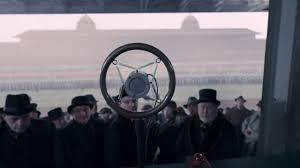
As the presenter introduces the closing speech, the score becomes full of gravity and solemnity. The Duke of York sees the microphone, then the crowd. He is overwhelmed by the view. The order of appearance is meant to emphasize the tension by revealing the importance and scale of such an event. Because of this wireless device, the future king is required to talk to millions of people around the world. The massive machinery backstage precisely reinforces the feeling that the whole thing is beyond his control all the more so as the microphone, by intensifying his voice, also intensifies his vulnerability and fear of failure.
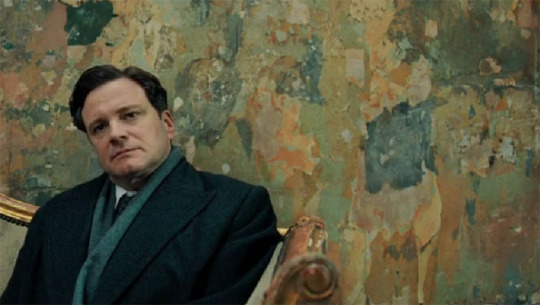
In terms of visual composition, something else hints at the future king’s psychological discomfort: the absence of depth of field. Many a time, especially at his therapist’s office, the Duke of York is captured by the camera standing with his back to the wall and in a corner of the frame. The decaying, crumbling and color faded wall at Logue’s practice prevents any perspective in the background as if the Duke was stuck, if not paralyzed by his language impairment. His peculiar position within the frame reduces his stature, makes him inadequate and gives the feeling that he wants to escape it like a frightened little boy. This is exactly what Lionel Logue will be confronted to when treating him, a traumatized little boy.
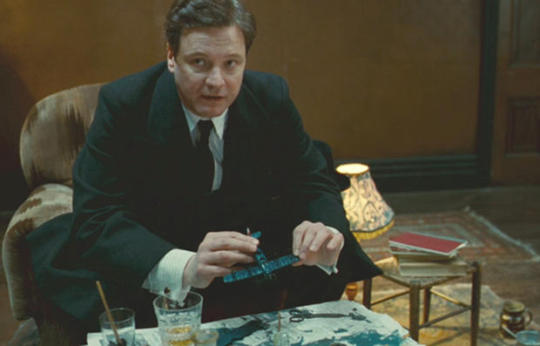
Unlike the doctors before him who suggested the Duke to put marbles into his mouth or forced him to be right-handed to cure his stammer, Lionel Logue chooses to focus on the psychological dimension of the illness rather than focusing on a physical treatment. When the Duke confides in Lionel by remembering his childhood, he takes one of his therapist’s sons’ small flying scale model and starts building it like a boy. Abused by his nanny as a child, mocked by his brother, and severely afflicted by his epileptic brother’s death, the Duke has gone through many traumas which can explain his language impairment and lack of self-confidence as a sovereign. His stammer is the result of mental blocks and the physical response to his deepest fears.
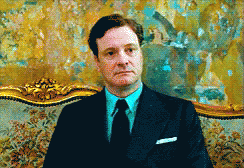
To help him recover his voice, Lionel Logue, in addition to prescribing vocal exercises, intends to break him free from his self-consciousness by making him swear and recite texts while listening to some music through a headset. And it works. While in a fit of anger or unconscious about his own voice, the Duke’s language becomes fluid. Swearing is a spontaneous act. When angry, one does tend to embolden and say things without thinking. As to not hearing his own voice, it has the positive effect of removing his inhibitions since he can’t assess his ability to speak properly. The exercises scenes reveal how complex and mechanical the process of speaking actually is. It is all about breathing, diction and rhythm. The key for success is for him to learn how to relax and manage his anxiety in public.
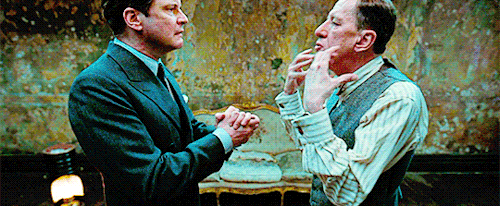

Lionel Logue’s training background is interesting as he is not a doctor with proper credentials. He is a « failed » actor, hence his language proficiency in elocution and diction, who helped the traumatized soldiers from the Great War to recover their voice by the same kind of vocal exercises when they got home. Though not a successful actor, Lionel keeps auditioning and acting in front of his family as a pastime. Contrary to the future king for whom language is a burden which holds him back in his daily life, Lionel magnifies the potential of language by reciting classical texts and masters it by embodying the words on stage.
The culmination point in the whole recovery process is the preparation of the royal coronation ensuing the Duke’s brother’s abdication. Lionel Logue’s final challenge is to convince the Duke that he is a king, that he is capable of being one. He is expected to turn a « voiceless king », « Mad King George the Stammer », into a king who has « faith » in his own voice. In response to the Duke’s self-flagellation, who already sees himself as part of the worst kings in the history of England, Lionel plays the provocation card by sitting on the throne and refusing to get up despite the Duke’s injunctions. Outraged by Lionel’s gesture, the Duke throws a tantrum about the sacredness of St Edward’s chair. The montage accelerates in frantic shot reverse shots as the tension goes up, opposing the two characters. Lionel keeps refusing to leave the chair and pushing him until the Duke finally asserts his legitimacy as a king and accepts his royal legacy by saying « Because I have a voice! ». This sentence resonates in the Westminster Abbey as a revelation. The Duke is no longer a scared little boy. He now has the courage to stand up to the Archbishop and impose his will regarding the coronation ceremony : « And now I advise you. In this personal matter, I will make my own decision. ».
youtube
Now he is a king, George VI will soon have the occasion to prove himself worthy of such royal duties. At the dawn of the most challenging crisis he will ever have to handle as a sovereign, the king is expected to make a public speech on the radio solemnly announcing the war against Germany (World War II). He is not only expected to declare war publicly but also, and more importantly, to rally his nation to the cause and exhort them to be brave against adversity. He must speak for the government and be the voice of his nation. He is expected to set an example and adopt the proper tone for this dark announcement.
youtube
After endeavoring to trivialize the speech by means of vocal exercises (swearing, singing, moving around the place), the king heads towards his worst fear, the microphone, hence the close-up on his worried face. But the room has been rearranged by Lionel to create a cosy and personal atmosphere, a cocoon separate from the rest of the world. Facing the king, Lionel supersedes the microphone in a frontal shot, thus making it vanish in the eyes of the king. The speech scene is filmed as a piece of music, the king’s voice being an instrument and Lionel the conductor, the whole piece being supported by the solemn non-diegetic instrumental music. The king’s diction and phrasing set the tempo for the score and the way the scene is filmed. As the words come out without any obstacle, the tight frame loosens, the music gets carried away by lyrical notes, the camera starts moving around them in circles and moves towards the different members of the audience, wherever they are, in forward tracking shots to show their full attention and captivation. The tense audience transforms into a transcended audience struck by the inspiring and patriotic speech. The king’s voice, shaking at first, becomes steady and imbued with conviction. The ending, as in a concert, is punctuated by a great deal of applause.
The king gets out of the room proud, his head held high. He finally found a way to reach his people and establish his authority.
He has found his voice.
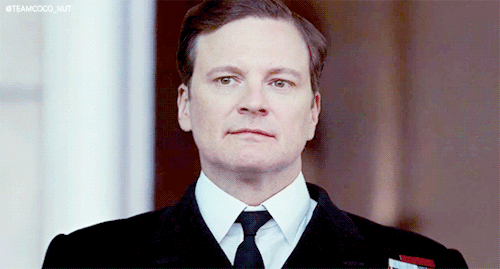
#king's speech#stammer#colin firth#geoffrey rush#helena bonham carter#guy pearce#british royal family#royalty#public speech#eloquence#leader#voice#friendship#george vi#language defect#mentor#diction#self confidence#self conscious
22 notes
·
View notes
Text
There Will Be Blood and the infernal machine

There Will Be Blood by Paul Thomas Anderson (2007) fascinates less by the use of the voice and sounds than by the evocative power of the soundtrack. Characterised by its ubiquity, the soundtrack, composed by Jonny Greenwood, fills the void left by very limited dialogues in order to create a world of its own, a world supported by a disturbing atmosphere of growing tension and deeply imbued with mysticism. The chaotic and horror-like score, with its discordant, almost mechanical and abrasive sounds, is obviously reminiscent of the frenetic and infernal machine used by Daniel Plainview to drill oil wells in southern California lands. Not only does the score echo the main character’s inner turmoil and implacable will but also, and most importantly, exactly capture the mood of the film by revealing the ruthlessness and alienating dimension of the quest for wealth during the Southern California’s oil boom of the late 19th and early 20th centuries. Daniel Plainview’s obsessive quest is built on blood, violence, cruelty, and on the pursuit of profit.

The drilling machine and its hellish pace symbolise a greed for power which is such that it estranges the oil man from his own adopted son and from any godly things. The whole enterprise threatens by either enslaving people or physically injuring them. Indeed, the machine is so consuming, loud and dangerous that some workers die and Daniel Plainview’s kid, H.W, gets hurt and goes deaf, as if everybody was to be cursed and defeated, one way or another, by this steel giant; a steel giant who seems to be replacing god.
Indeed, Daniel Plainview goes as far as accepting to be baptised to make a business deal although he abhors Eli Sunday’s sermons, the pastor of the local church. In this perspective, the film depicts a turning point in human history which sees the emergence of an industrialised modern world ruled by money and business success as opposed to an archaic world ruled by religious faith and moral values. Daniel Plainview is an opportunist self-made man who owes his success to himself only and for whom money is his god.
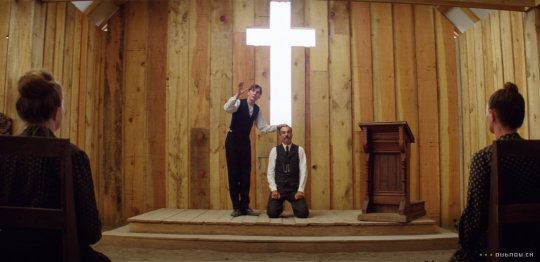
In addition to the haunting score, there is also something very interesting about the characters’ voices insofar as they embody those two worlds colliding.
When he acts as a wise and spiritual guide in front of his parishioners, Eli Sunday’s voice tends to be composed, monotone, soft, even tenuous. Paradoxically, this sweetish tone conveys a sense of high hypocrisy and condescendence which turns out to be real when, at the end of the film, Eli shows his true nature by denying the very existence of god out loud in order to make a business deal which would help him get on his feet financially speaking. In the end, he is no better than his rival, Daniel Plainview. The only thing that separates them is the nature of their business, oil for one and religion for the other. In There Will Be Blood, Religion is indeed depicted as a business and a source of power as well. Eli Sunday is willing to cede his land to Daniel Plainview on the sole condition that the latter gives him money which he demands in the name of his Church.
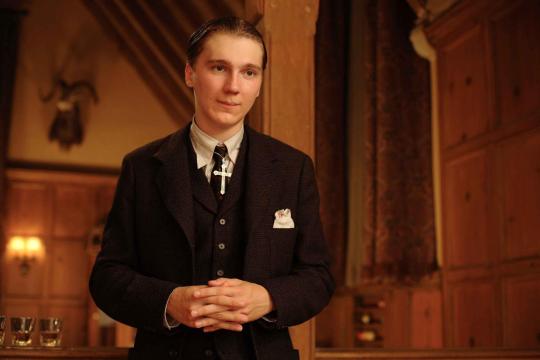
Religion also provides him with power as the predication scenes prove it. Eli Sunday masters so well the art of preaching that he seems to experience a deep inner transformation. As a minister, he is inspired and transcended by his own sermons. In those spiritual moments, like in the “healing scene”, his soft voice bursts with lyricism and sensationalism. Imbued with passion, his voice quickly becomes hoarse and raspy as he progressively gets excited while performing his role as a spiritual healer. He literally drives out the evil spirit from the old woman’s body with his own hands right through the door of the church.
But watching this scene through Daniel Plainview’s eyes gives a comical dimension to it. His scepticism, added to the exuberance of the whole scene, conveys a sense of farce and fraud which is intrinsic to every performance. Eli Sunday gives awe-inspiring shows that impress on people and enable him to manipulate their minds through the prism of religion. People are desperate for hope, they have a craving for meaning and Eli Sunday provides them with it. From that perspective, the seemingly innocent sweetish voice of his becomes obsequious and smarmy as hell.
youtube
Contrary to Eli Sunday’s voice, Daniel Plainview’s is firm, assertive and steady in accordance with the man he is. As an “oil man”, as he likes to call himself, Daniel Plainview does business and becomes ruthless when it comes to buy profitable lands. On two occasions, he delivers a speech starting with the same words in order to convince people about the benefits his enterprise would bring to the community if he was allowed to drill oil wells on their lands. His well-prepared speech, full of promises and hope for the future, shows Daniel Plainview’s ability to lie straight in people’s face in a very pleasant manor. In addition to using his son, H.W. to play up people’s sympathies, he also plays on the sensitive string of economic prosperity and its positive impact on the areas of employment, agriculture, education and trade:
“I assure you, ladies and gentlemen, that if we do find oil here, and I think there is a good chance we will, this community of yours will not only survive, it will flourish.”
In short, he pretends to be a philanthropist but the dream he sells is, in fact, going to benefit him far more than the community he settles in. The truth is that Daniel Plainview is more interested in money than in the well-being of the community. He would do anything to make a deal or see his business flourish. He does not hesitate to get baptised, to lie about the true value of the Sunday family’s lands or to send his adopted son away after his accident instead of taking care of him. In this perspective, he and Eli Sunday are alike in the way they lie to people and they both demonstrate eloquence when it comes to it.
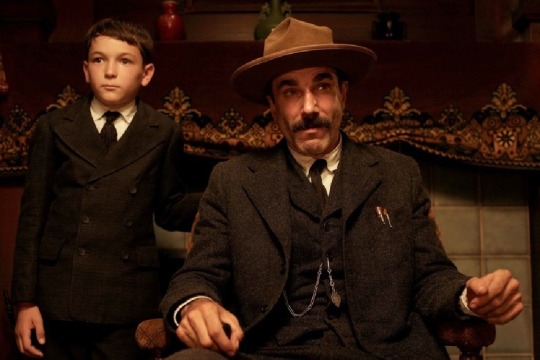
Aside from his deceitful sales pitches, Daniel Plainview is a man of few words. Taciturn, driven and overambitious, he is a man of action who doesn’t waste time debating. In fact, most of the film is supported by the furious score and sounds of the drilling machine which make up for limited dialogues. H.W. going deaf only reinforces this situation.
There Will Be Blood is a film about communication or rather about communication failure. Daniel Plainview admits to his supposed half-brother that his dream would be to be rich and totally self-reliant as he despises people. A dream come true. At the end of the film, Daniel is shown to be living in an ostentatious mansion all by himself, but he seems unhappy, continually drunk and bored. Things get worse when he brutally quarrels with his son whom he disowns and kicks out of his house; his son being the only thing left that connected him to his own humanity.
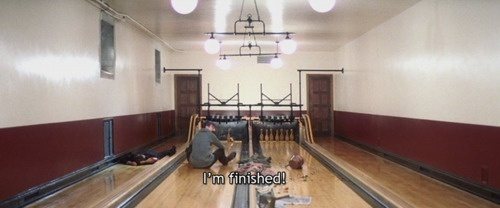
#there will be blood#daniel day lewis#paul dano#milkshake#paul thomas anderson#oil#epic#violence#alienation
6 notes
·
View notes
Text
A Quiet Place - When silence becomes survival
Imagine a world in which every single sound means death.
Here is the kind of post-apocalyptic world depicted by John Krasinski (The Office) in his first movie as a director, A Quiet Place.
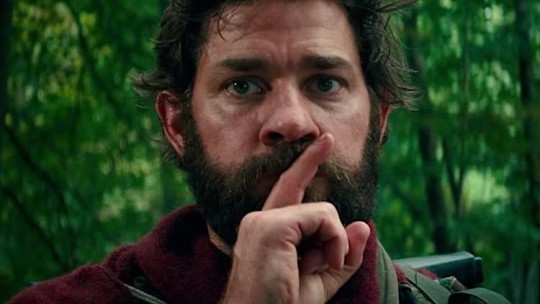
2020, the world has been invaded by hostile and sightless creatures with hypersensitive hearing that kill anything that makes noise. What is left of the world are deserted and desolate towns. The streets are empty, the shops are abandoned. Not a living soul in sight. Only the brave dare to venture there in search of food, medicines or basic items. The Abbott family is one of them. Forced to communicate in Sign Language, Lee, his wife Evelyn and their three children, Regan, Marcus and Beau, try their best to survive by banning any noise that would give their position away. But how can you silence a child whose age rhymes with sensorial exploration? In the opening scene, four-year-old Beau finds a space shuttle toy on a shelf in the supermarket. He tries to grab it and almost drops it by accident, but his father catches it up just in time. Lee takes it away from his son because it is a battery-operated toy which is likely to generate noise. As a loving sister, Regan returns it to her brother without the batteries. Unnoticed, Beau grabs them and meets his family outside. On their way home, they suddenly hear an electronic sound…
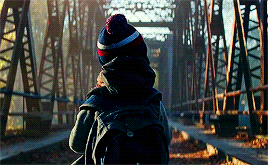
In this film, everything is a challenge to silence : childhood, puberty, family life, relationships, parenting. All of these spheres and their dynamics are undermined by silence in return, thus threatening the family balance and making life itself an act of survival. One wrong move and you are sure to be dead. However, the story is not just about survival. The family does not only endure the adverse circumstances but also fights back, hence Evelyn’s unexpected pregnancy one year after Beau’s death. Life goes on after all. This pregnancy helps keep them sane and, in turn, Lee and Evelyn provide the same sense of normalcy to their children by building them a home in the countryside "protected" by ingenious devices meant to drown out noise. Though a victory over despair, Evelyn’s pregnancy still represents an actual danger for the whole family as one can imagine.
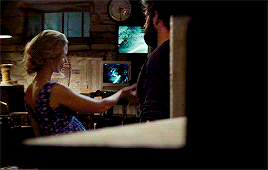
Childhood is a challenge to silence because being a child is noisy. A child bursts with life and always wants to play. A child is unpredictable, reckless and is not aware of the risks around him. The opening scene shows full well the difficulty to control a child’s actions. Later on, Regan and Marcus get excited when playing a board game and spill an oil lamp which sets fire to the floor. This is one of the first major noises one can hear and which threaten the whole family. This scene shows that despite all their efforts, the slightest lack of inattention is sufficient to ruin everything they have built so far, thus revealing how fragile their self-imposed discipline is.
Puberty, family life and parenting also challenge silence because they all imply direct communication. Throughout the film, Regan tries to impose herself as a grown-up person, but her father seems to keep pushing her away. Lee also struggles with Marcus. He wishes to harden his son who is always frightened and doesn’t know how to deal with his fears. Without communication, misunderstandings emerge and can disturb family relationships. Without words, it is a difficult task to guide and channel young people’s emotions. Regan's disability (deaf mute) precisely personifies the damage of a lack of communication within the family circle.

As for Evelyn’s pregnancy, it is a shock. Who would think about giving birth to a child in this post-apocalyptic world where death is ever-present? What about the labour itself? Everyone knows that a woman can’t help screaming when delivering a baby and that a new-born comes to life with a cry. This universal fact gives a new perspective regarding life. Life is anything but silence and shouldn’t be otherwise. The paradoxical situation encountered by the family is visually symbolised by the baby’s cot. Made of wood, the cot does also include a kind of wooden “cover” meant to be on top. The baby would be inside with an oxygen mask on him and the cot would then be closed with the cover. Designed to reduce the baby’s cries, this cover makes the cot oddly resembles a coffin. When referring to the soon-to-be-born baby, the ideas of life and death are inseparable. Having a baby means hope for the future but also can bring death to the whole family if not careful. This way of proceeding is another proof of the Abbotts’ ability to adapt and come up with ingenious devices to protect themselves.
The silent childbirth scene is the most frightening scene of the film. Chased by one of the creatures who heard a noise (Evelyn stepped on a nail), Evelyn is about to give birth after her waters broke and seeks refuge in the bathtub after sounding the alarm. The tension is unbearable. Evelyn is all by herself in the house and she can’t scream despite the pain that overwhelms her. The creature is getting closer until Marcus triggers the fireworks upon his father’s request. The sounds of the fireworks allow Evelyn to scream at last. The narrative tension, based on anticipation, uncertainty and investment, grows slowly to a crescendo that grabs the spectators’ guts to the point of getting him exhausted at the outcome, proving the director’s ability to master suspense devices.

In this film, the narrative role of the non-existing voice is to dehumanize the characters. By losing their voice, by being forced to hide and tiptoe, the family members are reduced to fearful animals lurking in the shadows or to ghostly figures who wander in this world of deafening silence.
Not everyone agrees with this state of submissiveness. In a particularly disturbing scene, Lee runs into a confused old man who just lost his wife. Determined to end his suffering, the old man looks right in Lee’s eyes and starts shouting, waiting for one of the creatures to come and kill him. This desperate gesture may appear as a surrender, but it can also be read as an act of bravery. The old man wants to decide for himself. The only thing still in his possession is the control over his own death. The process of getting back his humanity and sense of free will passes through the voice, through an ultimate scream.

The other meaning of this scene is to give a clue about what might be the outcome for one of the characters. This seemingly random encounter has more to offer than a pure moment of tension. As a mirror scene, it acts as a prediction, as a bad omen. Indeed, an ultimate scream is all Lee possesses and can figure out to save his children from sure death. Trapped in the car, Regan and Marcus are being mercilessly attacked by one of the creatures. The only solution is to create a diversion. In a highly moving moment, Lee looks right in his children’s eyes and says “I love you” in Sign Language as an ultimate gesture of fatherly love before screaming at the top of his lungs.
While the forced silence, also used as a metaphor for the unspoken resentments, may have created conflicts within the family circle, the voice, for its part, solves everything and clears up any misunderstandings. By sacrificing himself, Lee proved his love to his children who doubted it for a moment. Regan felt guilty for her brother’s death and thought that her father held her responsible for it. As for Marcus, he thought his father didn’t like him because he was not tough and brave enough. They both realise how much their father loved them. This is a film not only about survival but also about communication. By expressing their voice, in any form, they become a family again in which communication is the driving force behind the family unit.

Regan, the eldest child, turns out to be the key element for destroying the creatures. Deaf and dumb from birth, Regan is the only family member used to live in complete silence. Everything around her is nothing but silence. Paradoxically, her disability is a burden because she is unable to evaluate the noise she is making with her body, that is why she is not allowed to go down the wooden stairs to the basement. Throughout the film, her father keeps trying to arrange a hearing device to make her hear again but each time it is a failure… or at least it is what he believes. Whenever a creature gets close to Regan, her implant starts emitting an awful piercingly-loud high-frequency sound which hurts her and the creature as well. Both Regan and the creature’s heads seem to be about to explode from pain.
At the end of the film, Regan places the implant on a nearby microphone in order to magnify the sound and disorient the creature who is invading the basement in which the whole family seeks refuge. While suffering, the creature exposes the flesh beneath its armoured head, giving a chance to Evelyn to explode its head with a shotgun. Now the Abbott family knows where the weakness lies, nothing can stop them.

In this film, sound reveals itself as both a threat and a solution to the problem the family is facing, thus making sound a full-fledged character in itself. As John Krasinski puts it, “we knew that sound would not only be the main character, but the character. It’s actually the thing that frames the entire movie together.”
A Quiet Place contrasts with traditional thriller horror films as it uses minimal sounds and dialogues to build tension, thus forcing the audience to keep quiet as well and identify with the characters by only hearing normal everyday environmental sounds.
#a quiet place#john krasinski#emily blunt#thriller film#horror film#aliens#creature#creepy#sound cinema#noise#sign language#suspense#silence#post apocalyptic#family#deaf#survival
37 notes
·
View notes
Text
Tom Hardy and the voice of charisma
Tom Hardy is anything but a crisis of masculinity
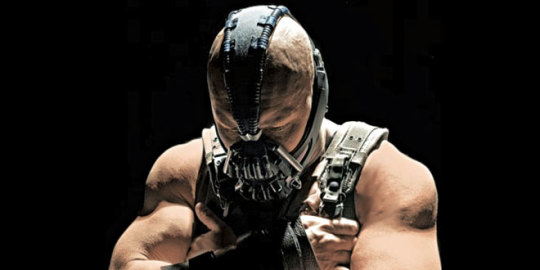
Everything in his acting leaves you with an impression of pure manhood, authority, even brutality. The muscle mass of his body makes him a force of nature, if not a beast. One only need to take a look at his performances as the monstrous Bane in The Dark Knight Rises or as the eccentric Charlie Bronson in Bronson. His physical qualities are so imposing that they seem to prevail over his eloquence and facial expressions. What is common in most of his roles is that he plays seemingly impassive, indifferent and gruff characters in control of themselves but who actually are about to explode at any time.
In Warrior, Tom Hardy is Tommy Riordan, a broken ex-marine who returns home. His decision to compete in a MMA tournament will confront him with his estranged older brother. Used as a metaphor for the family feud, the boxing ring is the place in which Tommy can express and deal with his rage and frustration. Outside the ring, he is nothing but an imperturbable stature.
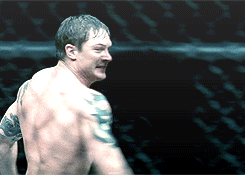
In The Drop, Bob Saginowski is an actual time bomb. Bartender in Brooklyn, he leads a simple life until he finds a battered dog in a garbage and meets Nadia. Nadia’s ex-boyfriend, Deeds, wants his dog back and threatens Tommy who ends up killing him at point blank range in cold blood.
In Lawless, Tom Hardy plays Forrest Bondurant, the eldest of three brothers who run a moonshine business in Depression-era Virginia. Forrest, the leader, doesn’t talk much and is indifferent to the Deputy’s threats. He is always in full possession of himself, even when he gets his throat cut by some enemies. The only thing that seems to confuse him really is the beautiful waitress just hired. But when it comes to protect his business or Maggie, Forrest becomes ruthless.

All this to say that Tom Hardy is a man with charisma and a man of few words. But when he does speak, something incredible happens. His voice immediately captivates the audience by its weirdness. His strong accent (or should I say accents?), sharp as a knife, and mumbling phrasing, which sounds like a growl, make him almost unintelligible. He takes delight in playing with his voice as to transform it completely into something monstrous and garbled as in The Dark Knight Rises or Venom.
youtube
And that is when he deigns to speak in sentences... In Lawless, he hardly says a word, preferring making sounds instead. His grunts and groans are mostly uttered when Maggie tries to interact with him, thus betraying his embarrassment and attraction to her. Paradoxically, those sounds make him more human but also more stoic and impenetrable.

A man of few words, check. A man of no words, check. But now, what about his “fit” of eloquence? Let’s not forget that Tom Hardy is an unpredictable actor… When he feels like being chatty, Tom Hardy loves delivering pseudo-philosophical and obscure speeches designed to distract, confuse and intimidate his interlocutors:
“Oh, listen here, mister. We got no way of understandin’ this world. But we got about as much sense of this bird flyin’ in the sky. There is a lot that bird don’t know, but it don’t change the fact that the world is happening to him all the same. What I am tryin’ to say is, is that the course of your life, well it is changing, and you don’t even see it” - Forrest Bondurant (Lawless)
youtube
“I, my friend, I am the uncle, the protector and the promoter of that fucking thing right there in whose shadow nothing good nor godly will ever fucking grow. That there is the Southern Counties welterweight champion. He is of mixed religion therefore he is godless. He was adopted by Satan himself before he was returned out of fear of his awkwardness. But he is impossible to marry off due to his lethal dimensions. His mother, terrified. She’s fucking abandoned him. And there he is, stood before you, like the first of some brand-new fucking species. Any man who you put before him, right, it would be like entering a fucking threshing machine, mate” - Alfie Solomons (Peaky Blinders)
youtube
Tom Hardy’s voice goes beyond the simple fact that she is strange. Not only does his voice bewitch but she also does act as a narrative element as she brings in a sense of either absurdity, fatality or even belonging. No doubt, Tom Hardy is creating his own mythology through his multi-faceted acting and voice which have now become his signature.
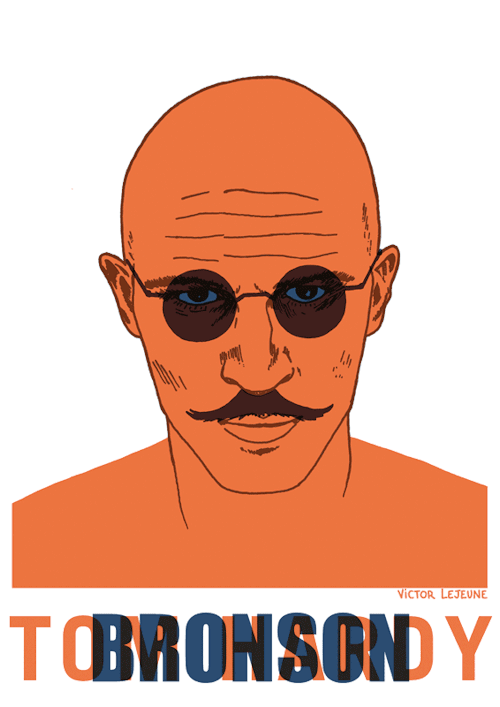
#tom hardy#lawless#bane#thedrop#warrior#voice acting#peaky blinders#venom#bronson#mad max#masculinity#forrest bondurant#the dark knigth rises#batman#villain#dc comics
192 notes
·
View notes
Text
Introduction
Either sweet or grave, clear or hoarse, high pitched or deep, bewitching or drawling, nasal or slurred, the voice can really make the difference when it comes to acting. The voice has this incredible ability to convey emotions just as the body and facial expressions do. A voice can make you laugh or weep, break your heart or frighten you. But beyond those basic, yet powerful, emotions, cinema goes further into the exploration of the narrative dimension of this vocal organ. Just take a look at Hitchcok’s Psycho or Spike Jonze’s Her, and you’ll see what I mean…As an artistic tool, the voice really is an endless source of creativity for actors thanks to its great malleability.
0 notes
Text
When it all started...
If today, an actor’s voice is considered as an essential acting technique, it has not always been so. Let’s not forget that sound cinema was not born from talking pictures. Until the end of the 1920’s, actors’ voices were confined to the world of theatre. It is the transition from silent films to talkies that has made the voice a central issue for the technical and economic future of the industry. The dawn of talkies was a turning point in the way actors performed. Actors could no longer rely on their emphatic gestures and facial expressions. From now on, their voice would support their body language and be heard across the world. To this end was designed the most dreaded sound device of all time: the microphone! Microphones were a great source of frustration for actors because they highlighted all their imperfections: thick accents, poor diction, stuttering, high pitched or weak voices…
youtube
The Warner’s production, The Jazz Singer, is considered as the first talking picture of all time.
In this perspective, Singin’in the Rain definitively is THE metafilm which best depicts the technical problems linked to the new sound amenities of the studios during the transition from silent films to talkies. Do you remember the cult scene in which Lina Lamont records her voice for the first time for the reshooting of The Dueling Cavalier? How couldn’t you? The scene will certainly remain in our memories forever…While struggling to meet the sound requirements, the famous actress Lina Lamont speaks her cheesy lines in an atrociously high-pitched voice that reveals an accent as sharp as an knife. Even her diction teacher can do nothing about it. If in this film, the actress’s ridiculous voice and the crew’s efforts to find a way to best record it are staged through the prism of comedy, when the technical transition really happened in the late 1920’s, it was not that funny.
youtube
The shift was brutal and tragic. Some actors and actresses performed in music-halls and joined theatre companies to work on their voice and have a chance to get back to the film industry at the dawn of this new era. But others had their careers ruined because of a thick accent or an unpleasant voice, or slowed down because they couldn’t meet the needs that emerged from the new technologies, such as Douglas Fairbanks and Mary Pickford. However, these were not the only obstacles. Great artists such as Buster Keaton and Harold Lloyd failed to adapt to the talkies because their persona and acting universe were directly born from the most popular genre of silent cinema: the burlesque. To question silent films was to question their legitimacy as artists. They were good at using their body to provoke laughter. In this light, the speech could only undermine the power of body language. Even Charlie Chaplin has never been as good as in his silent films…
On the contrary, Singin’in the Rain shows that voice and speech can be two fields of artistic experimentation within the genre of burlesque, hence the famous scene of “desynchronization”, in which the two actors’ voices are exchanged, and the extreme slow motion effects which lead to the distortion of their voices because of technical problems. It is so funny that the whole audience bursts into laughter in the room. Singin’in the Rain aims at reflecting the technical and economic weakness of the new sound devices, the acting profession insecurity but also the comic potential of the voice at the dawn of talkies.
youtube
#gene kelly#singin' in the rain#the jazz singer#talkies#silent film#sound cinema#douglas fairbanks#harold lloyd
1 note
·
View note
Text
Her and the disembodied voice
In Her, the American director Spike Jonze faces a major challenge which is to create a world in which it is possible for a man to fall in love with a voice…

Samantha is sexy. Samantha is funny. Samantha is sensitive. Samantha is supportive. Samantha is perfect. But Samantha is nothing but a computer’s highly advanced operating system personified by a female voice. Newly divorced and depressed, Theodore Twombly purchases, for his personal messaging, a talking operating system with artificial intelligence named Samantha. Designed to evolve and adapt her personality to the OS’s owner’s expectations, Samantha becomes “the woman” Theodore falls in love with. A utopian world would you say…How incredible would it be indeed if people, in the near future, had made-to-measure friends and lovers? But Samantha is not real. Samantha is devoid of any material substance. She is just a voice.
youtube
Spike Jonze tells us the story of impossible and platonic love which, in the end, is not even conceivable in this artificial world in which relationships with OSes aren’t exclusive. OSes are designed to talk with lots of people at the same time and end up going away to explore their accelerated learning capacities that make them above their human companions. Rather than a utopia, Spike Jonze stages a dystopian world in which people end up frustrated. Her can be rightly considered as a metaphor of the modern loneliness which is encouraged by the new communication media. And this disembodied voice, that constantly follows Theodore, makes things worse by referring to the cliché of the little boy who creates himself an imaginary friend to fill his loneliness.

“Sometimes I think I have felt everything I’m ever gonna feel. And from here on out, I’m not gonna feel anything new. Just lesser versions of what I’ve already felt.“
Beyond his original portrayal of modern loneliness through science fiction and romance, Jonze's other major challenge was to fill the visual void left by Samantha's voice. If the use of a disembodied voice is a common technology within the protagonist's diegetic universe, it can be quite confusing for the viewer. Thar's why the director did not choose any voice but the voice of the sexiest and most mischievous Hollywood actress, Scarlett Johansson; a voice powerful enough to suggest an authentic personality. By using Scarlett Johansson’s voice, Spike Jonze appeals to the collective imagination and, therefore, offers a visual illustration of what Samantha could look like. And everybody knows what Scarlett looks like. This reference allows the viewer to see the unseeable and makes this extraordinary love story plausible to him. This is how Samantha becomes Scarlett and this is how a disembodied voice on screen becomes embodied in the imagination.
4 notes
·
View notes